

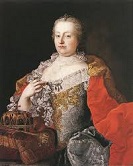






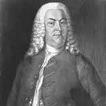
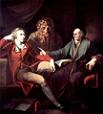






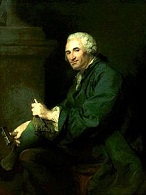
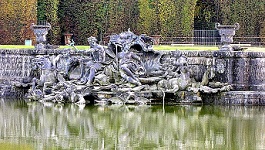
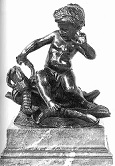
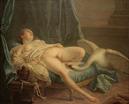



1740 Pop. of the Am. colonies: 900K. In 1740-1 (Year of Slaughter) extreme winters and bad potato and grain harvests cause widespread famine in Ireland, killing 300K-480K out of 2.4M (13%-20%); too bad, the Irish only become more reliant on potatoes, setting themselves up for regular famines? On Jan. 1 English clergyman John Wesley establishes the Covenant Renewal Service, launching the tradition of New Year's resolutions? In Jan. Gen. James Oglethorpe of Georgia invades Spanish-held Florida (Fla.), captures Ft. San Francisco de Pupo and Ft. Picolata on the San Juan River, then sieges St. Augustine in May-July. On Feb. 6 Pope (since 1730) Clement XII (b. 1652) dies, and on Aug. 17 Prospero Lorenzo Lambertini is elected Pope (#247) Benedict XIV (1675-1758), becoming the greatest scholar among the popes. On May 31 Hohenzollern Prussian king (since 1713) Frederick William I (b. 1688) dies, and his son Frederick II (the Great) (1712-86) becomes king #3 of Prussia (until Aug. 17, 1786), becoming a student of Macchiavelli, creating a strong army, and trying to duplicate Versailles at Potsdam (Sans Souci Park, New Palace, Orangery, Marble Palace, etc.), attracting Voltaire, La Mettrie, Euler, and other intellectuals; he introduces freedom of press and worship in Prussia; a Francophile who prefers French to German, he creates the Pour le Merite (Mérite) (AKA the Blue Max) as the highest German award for bravery; he is an avid flutist and composer, and one of the first art patrons to recognize the virtues of the pianoforte; a dead spider in his drink saves him from poisoning?; he makes his troops wear dark green uniforms of coarse cloth and put buttons on the top side of military sleeves to keep them from wiping their faces and soiling them; he orders soldiers to shave their faces and heads so that the enemy can't grab their hair and cut off their heads; the goose-step (Stechstritt) (Ger. "piercing step") is adopted. In Sept. British Adm. Sir George Anson, 1st Baron Anson (1697-1762) sets out on a round-the-world voyage (ends 1744) after starting out with seven vessels and preying on Spanish colonies and commerce during the War of Jenkins' Ear. I just met a girl named Maria? On Oct. 20 Austrian HRE (since 1711) Charles VI (b. 1685) dies unexpectedly after eating spoiled (Death Cap?) mushrooms, leaving no male heirs, only daughters Maria Theresa (1717-80) and Maria Anna Eleanor Wilhelmina Josepha (1718-44), who marries Charles Alexander Emanuel of Lorraine (1712-80) on Jan. 7, 1744, goes to the Austrian Netherlands as govs., then dies in childbirth on Dec. 16, leaving Maria Theresa as the Great White Hope; since he is the last male in the Hapsburg line, and money is not one to choose, and no you can't take it, no you can't take it away from me, his daughter Archduchess Maria Theresa (1717-80) becomes the first woman to inherit the lands of the hog-lipped Austrian Hapsburgs (backed by the Salic Law-bucking Pragmatic Sanction of 1713), and she takes the titles of queen of Hungary, queen of Bohemia, and archduchess of Austria, and goes in search of an emperor (being a squat-to-pee she couldn't have the title of empress without an emperor hubby?), going on to pursue a liberal policy, improve the lot of the serfs, and pump up the educational system; too bad, the idea of a female ruler doesn't go over well in Europe, and the War of the Austrian Succession begins (ends 1748) after Bavarian elector Charles Albert of Bavaria lays claim to Austria and Frederick II lays claim to Silesia, starting the First Silesian War (ends 1742), invading Silesia on Dec. 16; France seeks to ally with Prussia to help undress, er, dismember Austria; English public opinion is in favor of siding with Austria, but George II fears an attack upon his beloved Hanover, so he declares neutrality for a year. In Oct. unpopular Tsarina (since 1730) Anna Ivanovna (b. 1793) dies after naming 8-week-old infant Ivan VI (1740-64) (grandson of her sister and Ivan V) as Russian Romanov tsar #9 (until 1741), with her favorite Ernst Johann von Biron (Biren), Duke of Courland (1690-1772) as regent (until 1741), along with his unpopular mother Anna Leopoldovna (1718-46). Nadir Shah of Persia attacks the Uzbeks, invades Bukhara and Khiva, and annexes the lands up to the Oxus River; meanwhile after rumors of his death in India reach home, his son Reza-qoli Mirza orders former shahs Tahmasp II and Abbas III murdered to prevent a Safavid coup. A coalition of Arab tribes led by Ahmad bin Said al-Busaidi (1710-783), leader of a Yemeni tribe drives out the Ottomans and founds the Sultanate of Oman, which continues until modern times (ends ?). The Piman-speaking Yaqui Tribe of the Yaqui River Valley in Mexico begins a revolt against the Mexican govt. (ends 1741). Dossou Agadja (ruled since 1708) dies, and his son Tegbessou (Tegbesu) (Bossa Ahadee) (-1774) becomes king #6 of Dahomey (until 1774), going on to equip his army with blunderbuses and make £250K a year selling his fellow Africans into slavery by 1750. And Mingo is his name-o? By this year the Mohawks control the land W of the Hudson River around Albany, and the Mohicans the land to the E of it; the Iroquois-related Senecas and Cayugas begin migrating from New England to the S shores of Lake Erie, where they become known as Mingos; the Russians begin trading on the British Columbia coast. Run, niggah, run? S.C. passes a law making it legal to kill runaway slaves after 50 black slaves are hanged in Charleston, accused of planning another revolt; meanwhile in this decade Eliza Lucas Pinckney (1722-93), daughter of the gov. of Antigua founds the S.C. indigo industry on her father's plantation, becoming the first important Am. agriculturist; she later marries well-connected Charles Pinckney (-1758), producing a mini-dynasty of DOI signers and diplomats, and contributing to the golden age of Lily White Charleston - South Carolina white $ = indigo + rice + black muscle? There is a smallpox epidemic in Berlin. The last trial of an animal for sorcery is held in France, and the guilty cow is hanged by the neck - after his lawyers milk him for appeals? After refusing to fight against the Spanish and getting evicted from Ga. last year, Nazareth, Penn. in EC Penn. is founded by George Whitefield for German Protestant Moravian Brethren immigrants, complete with the Barony of Nazareth, a school for black children too bad, after arguing with them over predestination, Whitefield kicks the Moravians out, but falls into financial difficulties and sells it to them next July 16. In this decade the Old Lights and New Lights split over the emotionalism of the Great Awakening rivals, with 200+ congregations splitting to found their own New Light churches; in 1741 the Presbyterian New Lights split, founding their own colleges incl. Nassau Hall in Princeton, N.J. In this decade Murfree's Landing in N.C. is founded by William Murfree, growing into the town of Murfreesboro. In this decade the foul-smelling fast-growing deciduous Tree of Heaven (Ailanthus altissima) is imported from China to Europe, reaching the U.S. in 1784, becoming a pest. In this decade the Mariinsky Ballet (originally the Imperial Russian Ballet in St. Petersburg, Russia; during the Soviet era it becomes the Kirov Ballet. Late in this decade in response to John Henry Newman's Oxford Movement of 1833, the (Victorian) (Neo-) (Jigsaw) (Collegiate) Gothic Revival Architecture movement begins in England, attempting to recapture the alleged religious perfection of the Middle Ages, becoming dominant in the Victorian era, with bldgs. featuring finials, scalloping, lancet windows, decorative patterns, hood mouldings, and label stops; top architects incl. Thomas Rickman (1776-1841), Augustus Welby Northmore Pugin (1812-52) and his sons Edward Welby Pugin (1834-75) and Peter Paul Pugin (1851-1904), William Butterfield (1814-1900), Alfred Waterhouse (1830-1905), and George Edmund Street (1824-81). Poor Richard's Almanack for 1740. The Classic Period in Western Music begins (ends 1810). Frederick II the Great founds the Berlin Academy of Science. German organ builder John Snetzler moves to England. Franz Josef Haydn enters the court chapel in Vienna as a choirboy. Domenico Scarlatti goes to London and Dublin. German lit. critic Johann Christoph Gottsched (1700-66) of Leipzig U. gets into a controversy with Swiss writers Johann Jakob Bodmer and Johann Jakob Breitinger of Zurich, with Gottsched claiming that lit. should be subject to the laws of French classicism, while they tell him that artists are subject to no rules; by the time he becomes an old fart in the next decade, Gottsched loses and is considered a joke? Dublin, Ireland-born Margaret "Peg" Woffington (1720-60) makes her stage debut in Covent Garden, London as Sir Harry Wildair in George Farquhar's "The Constant Couple", and goes on to star there and at Drury Lane, specializing in female roles requiring male clothing, becoming the mistress and co-star of David Garrick. Joseph Butler (1692-1752), bishop of Bristol since 1738 becomes dean of St. Paul's (until 1750); a closet kind of guy, he was clerk of Queen Caroline's closet in 1736-7 and goes on to become clerk of King George II's closet from 1746-50 - du, du hast, du hast mich? The English Parliament introduces an act "to restrain and to prevent the excessive increase in horse racing"; it is largely ignored. Architecture: Westminster Bridge in Westminster, London is built in this decade, adding an alternative to the London Bridge for foot traffic crossing the Thames River. The Dickinson Mansion on Kitts Hummock Rd. in Dover, Del. is built by the father of Am. founding father John Dickinson. Inventions: Thomas Cole of England invents a sea quadrant. In this decade Benjamin Huntsman (1704-76) of England improves the crucible process for steel smelting. Science: Hold onto your bonnet, boys? Swiss botanist Charles Bonnet (1720-93) pub. his Dissertation on Aphids, describing parthenogenetic reproduction for the first time, winning him the honor of corresponding member of the French Academy of Science. And I owe it all to the Bissel Flipit? Emilie Du Chatelet (Gabrielle Émilie Le Tonnelier de Breteuil, Marquise Du Châtelet) (1706-49), a student of Pierre de Maupertuis, who attracted Voltaire to her scientific circle then became lovers and shacked up with him in her cozy chalet pub. a seminal paper in Institutes of Physics, based on experiments of Dutch scientist Willem Jacob 's Gravesande (1688-1742), backing up Gottfried Wilham von Leibniz' vis viva theory (energy is mass times speed squared, not mass times speed as Isaac Newton claims); being a woman, it is not accepted for a cent., and meanwhile she dies in 1749 at age 43 (15 years after hooking up with Volty) of an embolism 6 mo. after giving birth to a 4th child; "A great man whose only fault is being a woman." (Voltaire) French scientist Charles Marie de La Condamine (1701-74) discovers Curare. French military physician Pierre-Jean du Monchaux pub. the first known report of a Near-Death Experience (NDE) in Paris, attributing it to an increase in blood flow to the brain. Nonfiction: Johann Jakob Bodmer (1698-1783), Von dem Wunderbaren in der Poesie. Louis Castel, Optique des Couleurs. Colley Cibber (1671-1757), An Apology for the Life of Mr. Colley Cibber, Comedian; an autobio. combined with a defense against critics esp. Alexander Pope, becoming a hit and going through several eds.; "Happy in his own good opinion, the best of all others; teeming with animal spirits, and uniting the self-sufficiency of youth with the garrulity of age." (William Hazlitt) Ludovico Antonio Muratori (1672-1750), The Muratorian Fragment; from a ms. codex of 76 11 in. x 7. in. parchment leaves he discovered in the Ambrosian Library, produced in the Bobbio Monastery near Piacenza in N Italy in the 8th cent., then moved to the Ambrosian in the early 17th cent.; 85 lines of leaves 10-11 is the celebrated fragment, containing the oldest canon of the Christian Greek scriptures, later dated to 170-200 C.E., about the time of Rome-based Christian writer Hippolytus (170-235). Isaac Newton (1643-1727), The Method of Fluxions; tr. into French by Comte de Buffon. Louis de Rouvroy, Duc de Saint-Simon (1675-1755), Memoires (1740-52). J.A. Scheibe (1708-76), Der Critische Musicus; against J.S. Bach. Thomas Simpson (1710-61), The Nature and Laws of Chance. William Stukeley (1687-1765), Stonehenge; links it to the Druids, helping to make them cool again; attempts to date it, coming up with 460 B.C.E., fostering a renewal of Celticism. Christian Wolff (1679-1754), Jus Naturae and Jus Gentium (1740-9). Music: Thomas Augustine Arne, Alfred (opera) (Berlin); about King Alfred of England; contains the melody for Rule, Britannia to celebrate the accession of George I. Carlo Goldoni (1707-93), Oronte, Re de' Sciti (opera); Statira (opera). G.F. Handel (1685-1759), Imeneo (HWV 41) (Hymen) (opera) (Lincoln's Inn Fields, London) (Nov. 22); libretto adapted from Silvio Stamiglia's "Imeneo"; stars William Savage as Imeneo. Art: Lambert-Sigisbert Adam (1700-59), The Triumph of Neptune and Amphitrite (sculpture); later (1740) cast in lead for the central fountain in the Bassin de Neptune in Versailles, establishing his rep. and insuring his income; Child Being Pinched by a Lobster. Francois Boucher (1703-70), The Triumph of Venus; Vertumnus and Pomona (1740-5); Cupids in Conspiracy; Music and Dance; Landscape Near Beauvais; Head of a Young Girl; Leda and the Swan - take a whiff of my copulins? Canaletto (1697-1768), Return of the Bucintoro. Jean-Baptiste-Simeon Chardin (1699-1779), Saying Grace; Le Benedicite. Guillaume Coustou the Elder (1677-1746), Horse Tamer (1740-5); at Marly le Roi. William Hogarth (1697-1764), The Shrimp Girl; Captain Coram. Peter Scheemakers (1691-1781), William Shakespeare (statue) (Westminster Abbey). Plays: David Garrick (1717-79), Lethe; or, Aesop in the Shade (first play) (Theatre Royal, Drury Lane, London). Johann Christoph Gottsched (1700-66), Deutsche Schaubuhne (6 vols.) (1740-5); translations of French plays to German. Novels: Samuel Richardson (1689-1761), Pamela; Or, Virtue Rewarded; 15-y.-o. Pamela Andrews loses her mother, and is sexually harassed by landlord Mr. B., who first tries to seduce her, then rape her, and finally proposes honorable marriage; a bestseller. Births: Swedish "Songs of Fredman", "Epistles of Fredman" lyric poet, cittern player, and composer Carl Michael (Karl Mikael) Bellmann (d. 1795) on Feb. 4 in Stockholm; son of a prof. at the U. of Uppsala. Italian printer and type designer Giambattista Bodoni (d. 1813) on Feb. 16 in Saluzzo, Piedmont; manager of a printing house in the duchy of Parma by appointment of Duke Don Ferdinand; designer of Bodoni Book Type, the first modern Roman-style type face. Swiss Alpine traveler and scientist ("Founder of Alpinism") Horace-Benedict de Saussure (d. 1799) on Feb. 17 in Conches (near Geneva); father of Nicolas de Saussure (1767-1845). Am. Rev. financier (Jewish) ("Financial Hero of the Am. Rev.") Haym (Chaim) Salomon (Solomon) (d. 1785) on Apr. 7 in Leszno (Lissa), Poland; emigrates to the U.S. in 1772. French Bastille gov. (1776-89) Bernard-Rene (Bernard-René) Jourdan, Marquis de Launay (b. 1789) on Apr. 8/9 in Paris; born in the Bastille, where his father is gov. Am. statesman-atty. Elias Boudinot Jr. (d. 1821) on May 2 in Philadelphia, Penn. Russian Gen. (Lutheran) (Freemason)) Ivan Ivanovich Michelson (Johann von Michelsohnen) (d. 1807) on May 3 in Revel, Estonia; noble parents. Italian composer Giovanni Paisiello (Paesiello) (d. 1816) on May 10 in Taranto; educated in Naples. Am. loyalist lawyer Daniel Leonard (d. 1829) (AKA Massachusettensis) on May 18 in Norton, Mass.; educated at Harvard U. French "Justine", "The 120 Days of Sodom" novelist-porno writer ("Father of Sadism") Donatien Alphonse Francois, Marquis de Sade (d. 1814) on June 2 in Conde Palace, Paris; father Jean-Baptiste Francois Joseph de Sade is cousin to the Princess of Conde; spends 32 years in prison, incl. 10 years in the Bastille and 13 years in Charenton Asylum. English "Inkle and Yarico" composer-organist Samuel Arnold (d. 1802) on Aug. 10 in London; son of Thomas Arnold and Princess Amelia. German "Death and the Maiden" poet Matthias Claudius (d. 1815) (AKA Asmus) on Aug. 15 in Reinfeld (near Lubeck), Holstein; not to be confused with Friedrich Matthias Claudius (1822-69). Russian tsar (1740-1) Ivan VI Antonovich (d. 1764) on Aug. 23 (Aug. 12 Old Style); son of Anna Leopoldovna (1718-46); grandson of Ivan V (1666-96). Am. turtle (submarine) inventor David Bushnell (d. 1824) on Aug. 30 near Saybrook, Conn.; educated at Yale U. French pastor-philanthropist Jean-Frederic Oberlin (d. 1826) on Aug. 31 in Strasbourg, France. English Radical political reformer ("the Father of Reform") Maj. John Cartwright (d. 1824) on Sept. 17 in Marnham, Bassetlaw, Nottinghamshire; brother of inventor Edmund Cartwright (1743-1823). Japanese empress #117 (1762-71) Go-Sakuramachi (Toshiko) (d. 1813) on Sept. 23; 2nd daughter of Sakuramachi (1720-50); brother of Momozono (1741-62). Scottish biographer-atty. James Boswell (of Affleck) (d. 1795) on Oct. 29 in Edinburgh; descended from the Stuart kings. Am. Rev. leader-jurist (DOI signer) William Paca (d. 1799) on Oct. 31 near Abingdon, Md. English "Rock of Ages" Anglican clergyman-hymnodist (Calvinist) Augustus Montague Toplady (d. 1778) on Nov. 4 in Farnham, Surrey; Irish father; educated at Trinity College, Dublin. English sculptor John Bacon Sr. (d. 1799) on Nov. 24 in Southwark; father of John Bacon Jr. (1777-1859). Scottish encyclopedist William Smellie (d. 1795) in the Pleasance, Edinburgh; friend of Robert Burns. Am. Rev. War. maj. gen. and jurist John Sullivan (d. 1795) in Somersworth, N.H.; Irish immigrant parents; brother of James Sullivan (1744-1808). English steel puddling process inventor Henry Cort (d. 1800). French balloonist Joseph Michel Montgolfier (d. 1810) in Annonay (near Lyons); brother of Jacques Etienne Montgolfier (1745-99); son of a paper manufacturer; co-inventor of the first practical hot air balloon (paper filled with smoke). English "The Effects of Civilization" Ricardian socialist physician-writer Charles Hall (d. 1825); educated at the U. of Leiden. Am. celeb Elizabeth Cary, Lady Amherst of Holmesdale (d. 1830); daughter of Lt.-Gen. Hon. George Cary and Isabella Ingram; wife (1767-) of Field Marshal Jeffrey Amherst (1716-97). Deaths: Italian violin maker Girolamo Amati (b. 1649) on Feb. 21 in Cremona. Swedish scientist-explorer Olof Rudbeck the Younger (b. 1660). Austrian portrait painter Johann Kupetzky (b. 1667) on July 16 in Nuremberg, Germany. French-born English surgeon Claudius Amyand (b. 1680) on July 6 in London; dies from a fall in Greenwich Park. English lexicographer Ephraim Chambers (b. 1680) on May 15 in London. French Camisard leader Jean Cavalier (b. 1681) on May 18 in Chelsea, England. Russian tsarina Anna Ivanovna (b. 1693) in Oct.




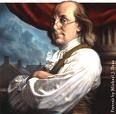




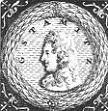


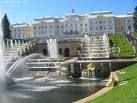
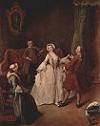
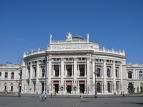
1741 Famine still grips Ireland. In Mar. the Prussian army under gen. Leopold II Maximilian, Prince of Anhalt-Dessau (1700-51) (son of the Alte Dessauer) captures Glogow (Glogów) in Poland in a night attack, after which the Prussians change the name to Greater Glogau. On Apr. 10 the Prussians under Frederick II the Great defeat the Austrians at the Battle of Mollwitz and conquer Silesia, capturing the cities of Brieg, Neisse, Glatz, and Olmutz; in July Frederick II allies Prussia and Charles VII Albert (who claims the German Hapsburg territories after the death of Charles VI last year) allies Bavaria with France and Spain in the secret Treaty of Nymphenburg near Munich, Bavaria; nympho Maria Theresa arranges a truce mediated by England. On hot-hot-hot July 8 the Great Awakening reaches a peak as Jonathan Edwards (1703-58) delivers his Sinners in the Hands of an Angry God speech in Enfield, Mass., featuring lurid word pictures of Da Judge Bible God Jehovah, who "holds you over the pit of Hell, much as one holds a spider, or some loathsome insect, over the fire, abhors you, and is dreadfully provoked... He looks upon you as worthy of nothing else, but to be cast into the fire"; the Great Awakening splits New England Puritanism into the "Old Lights" and the "New Lights", who go over to the Baptists, Presbyterians, or Methodists; the Am. colonies are prepared for rev. by the Great Awakening? On July 17 Oxford U. dumps its policy of granting bachelor of arts degrees based on the recommendation of a tutor, and makes candidates take a written exam. On July 31 Charles VII Albert of Bavaria and the French invade Upper Austria and occupy Passau, then Linz on Sept. 15. On Sept. 11 the Diet of Pressburg offers Hungarian help to Maria Theresa, and she accepts the crown of Hungary. On Oct. 19 Hereford, England-born David Garrick (1717-79), pupil of Irish actor Charles Macklin (1697-1797) makes his acting debut in Thomas Southerne's "Oroonoko or the Royal Slave" in Ipswich, followed by the title role in Shakespeare's "Richard III" in Goodman's Fields, London, displaying a new more realistic acting style that makes him a star, appearing in 18 different roles in 6 mo. in London's Drury Lane and Covent Garden; his career raises acting to a more respected profession; Charles Fleetwood hires him for a season at the Theatre Royale in Drury Lane, London, where he remains for five years. Like taking candy from a baby? On Nov. 25 horse-loving never-married (four-lovers-at-a-time?) Elizabeth (Elizaveta) (Yelisaveta) Petrovna Romanov (1709-62) (daughter of Peter I the Great and Catherine I) stages a palace rev., overthrows the Duke of Courland, desposes baby Ivan VI, and on Dec. 6 seizes the throne as Russian Romanov tsar #10 (until Jan. 5, 1762), putting little Ivan VI into solitary confinement for life, becoming popular for her anti-Prussian policies and for not executing anybody. On Nov. 26 after planning on conquering Vienna but getting redirected to Bohemia, Charles Albert of Bavaria (1697-1745) occupies Prague with a combined force of Bavarian, French, and Saxon troops, and has himself crowned king of Bohemia on Dec. 19, followed by HRE on Jan. 24, 1742 (until Jan. 20, 1745). On Dec. 8 (Dec. 19 Old Style) Danish-Russian explorer Vitus Jonassen Bering (b. 1681) dies on Bering Island of exposure after discovering Alaska; during his expedition, German naturalist Georg Wilhelm Steller (1709-46) discovers Steller's sea cow (Hydrodamalis gigas) in the Commander Islands; too bad, it becomes extinct in 1768. On Dec. 24 (Christmas Eve) Bethlehem, Penn. ("America's Christmas City") next to South Mountain is founded by Moravians from Bohemia and Saxony led by David Zeisberger, later going on to hold an annual Bach Festival each May, install a 100-ft. electric star on top of South Mountain for Yuletide celebrations, and become a center for steel and cement production. Prussia seizes Wroclaw in SW Poland on the Oder River from the Hapsburgs (who held it since 1526), and it remains a part of Prussian Silesia (except for a few brief periods) under the name Breslau until 1945. British PM Robert Walpole (1676-1745) survives a confidence vote over his reluctant handling of the Spanish War (War of Jenkins' Ear), but his Whig Party loses the election over the old cry that Britain is being subordinated to Hanover in the Austrian question. William Shirley (1694-1771) becomes British gov. of Mass. (until 1759). A British expedition fails to capture heavily-fortified Cartagena in NW Colombia on the Caribbean after a 3 mo. siege. The Yaqui Revolt in Mexico (begun 1740) is quashed. The Racist Witch Hunt (New York Conspiracy)(Great Negro Plot) (Slave Insurrection) of 1741 engulfs burning New York City after 16-y.-o. white indentured servant Mary Burton is promised her freedom for her testimony, and claims that the blacks are planning to burn the town to the ground, after which 13 are burned alive, 18 are hanged, 100 "disappeared", and 154 jailed before the city is whitened up enough to please the monsterizers, after which four whites are executed and 24 imprisoned as a coverup? The original Hollywood Walk of Fame? The myth of Plymouth Rock is born when 95-y.-o. church elder Thomas Faunce (1646-1741) stops the building of a pier on the waterfront of Plymouth, Mass. for awhile with the story that his father, who arrived in 1623 had told him that a small boulder on the tide line near Town Brook is where the Pilgrims had first landed on Dec. 22, 1620 (Forefathers' Day); Hedge's Wharf is built over it in 1749 anyway, but the tip still pokes above its sandy surface, and on Dec. 22, 1774 Col. Theophilus Cotton (1716-82) and the Sons of Liberty remove it and break it in half while attempting to load it on a wagon, putting one half back in the ground and taking the other half to the town square beside a new liberty pole, symbolizing the coming you know what? Count von Zinzendorf visits North Am., pumping up the Moravian sect among whites and Indians (until 1743). Russian navigator discovers some of the Aleutian Islands, and lands in Calif. Pardon me I never promised you a what? Henry Middleton (1717-84) (later pres. #2 of the First Continental Congress) creates his famous gardens at Middleton Place in S.C. Carl Linnaeus founds the Botanical Garden in Uppsala, Sweden. Czech violinist-composer Johann Wenzel Anton Stamitz (Jan Vaclav Stamic) (1717-57) joins the Mannheim, Germany orchestra, rising to court kappelmeister in Mannheim in 1750, and going on to turn it into "an army of generals" (until 1770). The Royal Military Academy in Woolwich, England is founded to train artillery and engineering officers - blow them arms and legs off for your country real good, boys? Hans N. Eisenhauer, ancestor of U.S. Pres. Dwight David Eisenhower arrives in the U.S. The word "floccinaucinihilipilification" (estimating something as worthless) (invented by a student of Eton College, based on the Latin phrases "flocci facere", "nauci facere", "nihili facere", and "pili facere") is first used in a letter by William Shenstone, with the soundbyte "I loved him for nothing so much as his" you know what. Andrew Bradford's Am. Magazine becomes the first mag. pub. in North Am. Benjamin Franklin (1706-90) begins pub. The General Magazine and Historical Chronicle for All the British Plantations in America, which incl. the first North Am. magazine ads (for the Franklin stove, which looks like an open fireplace); it fails after six issues. Poor Richard's Almanack of 1741; "Beauty, like supreme dominion, is supported by public opinion". Sports: On Sept. 23 after Shock White of Ryegate uses a cricket bat as wide as the wicket against the Hambledon Club, the max. cricket bat width it set at 4.25", which becomes a std. Famine or not, horseracing begins in Ireland at the Curragh Racetrack in County Kildare, which claims to have hosted chariot races in the 3rd cent. C.E., and which becomes the center of flat racing in Ireland; in Nov. 1749 the Sportsmen of the Curragh are formed in the Rose and Bottle in Dame St., Dublin, which in 1790 becomes the Turf Club. Architecture: The Burgtheater (K.K. Theater an der Burg) ("Die Burg") is founded in Vienna as the nat. theater, becoming the 2nd oldest Euro theater after the Comedie Francaise in Paris; later, HRE Joseph II forbids curtain calls, believing the applause should be for him, not his actors, who are mere servants? Johann Joachim Quantz becomes court composer to Frederick the Great. Italian architect Francesco Bartolomeo Rastrelli (1700-71) designs the Summer Palace in St. Petersburg, Russia. Jacques Germain Soufflot designs the Hotel-Dieu in Lyons (Lyon), France. Nonfiction: Thomas Betterton (1635-1710), A History of the English Stage. Johann Jakob Bodmer, Kritische Betrachtungen Ube die Poetischen Gemahlde der Dichter; pleads for freedom from straightjacket French classicism. C.W. von Borck (tr.), Julius Caesar; first German tr. of Shakespeare. Jean Hardouin (1646-1729), Commentaries on the New Testament (posth.); disses the New Testament, its chronology, etc.; placed on the Catholic Prohibited Books Index. David Hume (1711-76), Essays, Moral and Political (1741-2); his first bestseller; too bad, it doesn't get him an appointement to the U. of Edinburgh faculty, so he becomes the tutor of the lunatic marquis of Annandale, then judge advocate to an English military expedition to France, allowing him to wear a prudish white wig? Pierre de Mapertuis (1698-1759), Essai de Cosmologie; contains the first vague description of the law of the survival of the fittest in Nature. John Martyn (1699-1768) (tr.), Virgil's Georgics; follows it with a trans. of Virgil's Ecologues in 1749. Samuel Richardson (1689-1761), Familiar Letters. Music: J.S. Bach (1685-1750), The Goldberg Variations, BWV988; 30 variations for harpshichord; composed for Goldberg to play for insomniac Count Kaiserling of Saxony. Charles Simon Favart (1710-92), La Chercheuse d'Esprit (operetta). Christoph Gluck (1714-87), Artaserse (first opera) (Milan) (Dec. 26); a success. G.F. Handel (1685-1759), Deidamia (HWV 42) (last opera) (Lincoln's Inn Fields, London) (Jan. 10); libretto by Paolo Antonio Rolli; flops after 3 performances, proving that the prudish Bible-thumping English don't go for sexy Italian opera anymore, causing Handel, who lost a fortune already to give up opera for Bible-themed oratorios. Jean-Philippe Rameau (1683-1764), Pieces de Clavecin en Concert. Art: Francois Boucher (1703-70), Autumn. William Hogarth (1697-1764), The Enraged Musician; David Garrick as Richard III. Pietro Longhi (1702-85), The Dancing Lesson. Plays: Robert Dodsley, The Blind Beggar of Bethnal Green (drama). David Garrick (1717-79), The Lying Valet: A Peep Behind the Curtain; Or, the New Rehearsal. Carlo Goldoni (1707-93), La Donna di Garbo (The Fashionable Woman) (comedy) (Venice); Il Mercante Fallito so Sia La Bancarotta (The Bankrupted Merchant) (comedy). Voltaire (1694-1778), Mahomet the Prophet; or, Fanaticism (Le Fanatisme, ou Mohamet le Prophete) (tragedy) (Lille) (Apr. 25); dedicated to Cardinal Fleury; "Written in opposition to the founder of a false and barbarous sect to whom could I with more propriety inscribe a satire on the cruelty and errors of a false prophet"; Voltaire reads the play to Frederick II the Great of Prussia in 1740 in Belgium, and when he invades Austria this year, Voltaire interrupts a performance to announce the news, which Freddy had sent him specially; next Aug. 9 it debuts at the Comedie-Francaise in Paris, but is banned after the 3rd performance at the instigation of the Jansenists, who consider it a veiled attack on the Church. Poetry: William Collins (1721-59), Persian (Oriental) Eclogues; written in 1738 before attending Oxford U. Ugo Foscolo (1778-1827), Le Grazie (posth.); the glories of the ancient world. Ludvig Holberg (1684-1754), Nicolai Klimii Iter Subterraneum. William Shenstone (1714-63), The Schoolmistress. William Somerville (1675-1742), Hobbinol; or The Rural Games; the Coswold Games. Novels: Henry Fielding (1707-54), The History of the Adventures of Joseph Andrews and of His Friend Mr. Abraham Adams: An Apology for the Life of Mrs. Shamela Andrews; an anon. parody of Samuel Richardson's 1740 "Pamela", introducing the omniscient narrator - I have a Ph.d - a pretty huge d? Births: English children's writer Sarah Trimmer (d. 1810) on Jan. 6 in Ipswich. Am. Rev. gen. and traitor ("Hero of Saratoga") (George Washington lookalike?) Benedict Arnold (d. 1801) on Jan. 14 in Norwich, Conn.; starts out as a Conn. merchant. English writer Mrs. Hester Thrale (Hester Lynch Piozzi) (nee Salusbury) (d. 1821) on Jan. 16 in Bodvel, Carnarvonshire, Wales; friend of Dr. Samuel Johnson. Swiss-English painter Henry Fuseli (Johann Heinrich Fussli) (d. 1825) on Feb. 7 in Zurich; 2nd of 18 children; son of Johann Caspar Fuseli (1706-82); teacher of John Constable (1776-1837), Benjamin Robert Haydon et al.; likes the supernatural element; one of his paintings causes the phrase "between Scylla and Charybdis" to be coined. French "Le Huron", "Zemire et Azor", "Richard Coeur de Lion" composer Andre Ernest Modeste Gretry (André Ernest Modeste Grétry) (d. 1813) on Feb. 8 in Liege, Belgium. Austrian "Well, there it is" HRE (1765-90) ("the Music King") ("the Benevolent Despot") Joseph II (d. 1790) on Mar. 13 in Vienna; eldest son of Francis I (1708-65) and Maria Theresa (1717-80). French neoclassical sculptor (Freemason) Jean-Antoine Houdon (d. 1828) on Mar. 25 in Versailles; famous for his busts of Benjamin Franklin, Voltaire, George Washington, Moliere, Denis Diderot, Jean-Jacques Rousseau et al. Japanese Yamato emperor #116 (1747-62) Momozono (Toohito) (d. 1762) on Apr. 14; eldest son of Sakuramachi (1720-50). Am. portraitist (Washington, Franklin, Adams, Jefferson) Charles Willson Peale (d. 1827) on Apr. 15 in Chester, Md.; father of Washington-Jefferson portraitist Rembrandt Peale (1778-1860). U.S. Supreme Court justice #8 (1796-1811) (DOI signer) (states-righter-turned-Federalist) Samuel Chase (d. 1811) on Apr. 17 in Somerset County, Md.; 1st U.S. Supreme Court justice to be impeached (until ?). Am. statesman-lawyer (DOI signer) John Penn (d. 1788) on May 17 near Port Royal, Caroline County, Va. Am. Rev. War gen. and physician (martyr-hero of the Battle of Bunker Hill) Joseph Warren (d. 1775) on June 11 in Roxbury, Mass.; educated at Harvard U. English Wilson's Theorem mathematician Sir John Wilson (d. 1793) on Aug. 6 in Applethwaite, Westmorland; educated at Peterhouse, Cambridge U.; student of Edward Waring. French explorer Jean-Francois de Galaup, Comte de La Perouse (Pérouse) (Laperouse) (Lapérouse) (d. 1788) on Aug. 23 near Albi. Am. statesman Joseph Reed (d. 1785) on Aug. 27 in Trenton, N.J.; gov. of Penn. (1778-81). German naturalist (in Russia) Peter Simon Pallas (d. 1811) on Sept. 22 in Berlin. French Roman Catholic priest (short hunchback?) Abbe Francois Simonet de Coulmier (d. 1818) on Sept. 30 in Dijon. Irish "The Progress of Human Culture" Neoclassical painter James Barry (d. 1806) on Oct. 11 in Cork; influences William Blake. French "Les Liaisons Dangereuses" novelist (Freemason) Gen. Pierre Ambroise Francois Choderlos de Laclos (d. 1803) on Oct. 18 in Amiens. Swiss-Austrian Neoclassical painter Maria Anna Angelica (Angelika) Katharina Kauffmann (d. 1807) on Oct. 30 in Chur, Graubunden; grows up in Austria. Dutch Patriots leader Joan Derk, Baron van der Capellen tot den Pol (d. 1784) on Nov. 2 in Tiel. French Roman Catholic priest Pierre Joseph Georges Pigneau de Behaine (d. 1799) on Nov. 2 in Behaine, Origny-en-Thierache (Aisne); moves to South Vietnam in 1765, becoming apostolic vicar of Cochin China. British Am. Rev. Loyalist leader Sir John Johnson, 2nd Baronet of New York (Nee John Wysen Bergh) (d. 1830) in Amsterdam, N.Y.; son of Irish immigrant Sir William Johnson, 1st baronet (1715-774) and common-law wife Palatine German immigrant Catherine Weissenberg. Swiss poet-physiognomist (phrenology founder) Johann Kaspar Lavater (d. 1801) on Nov. 15 in Zurich. Am. Universalist clergyman ("the Father of American Universalism") John Murray (d. 1815) on Dec. 10 in Alton, Hampshire, England; emigrates to Am. in 1770. English celeb courtesan Catherine Marie "Kitty" Fisher (Fischer) (d. 1767). Dutch novelist Aagje (Agatha) Deken (d. 1804) in Nieuwer-Amstel; collaborator of Betje Wolff-Bekker (1738-1804). Am. Rev. leader (DOI signer) George Walton (d. 1804) in Prince Edward County, Va.; moves to Ga. in 1769. Am. Rev. leader John Langdon (d. 1819) in Portsmouth, N.H.; N.H. gov. (1788, 1805-11); U.S. sen. (1789-1801). Russian gen. Count Ivan Vasilyevich Gudovich (d. 1820); of Ukrainian descent. Turkish gov. (of Albania and parts of Greece incl. Janina) ("the Lion of Janina") Ali Pasha Arslan (d. 1822) in Tepeleni, Albania. Deaths: Italian scientist Francesco Torti (b. 1658). Austrian musician Johann Joseph Fux (b. 1660) on Feb. 13 - fux who? German-born British phosphorus manufacturer Ambrose Godfrey (b. 1660) on Jan. 15. French historian Charles Rollin (b. 1661) on Dec. 14 in Paris; dies leaving the unfinished Histoire Romaine (Roman History). German printmaker Jacob Christoph Le Blon (b. 1667) on May 15 in Paris. Austrian field marshal Count Wirich Philipp von Daun (b. 1669) on July 30 in Vienna. Italian red-haired composer "Il Prete Rosso" (The Red Priest) Antonio Vivaldi (b. 1678) on July 28. Danish-Russian explorer Vitus Bering (b. 1681) on Dec. 8 (Dec. 19 Old Style) in Bering Island (exposure). Austrian sculptor Georg Raphael Donner (b. 1692) on Feb. 15 in Vienna.



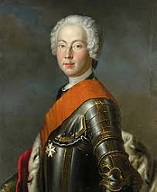
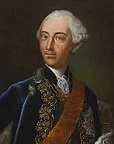











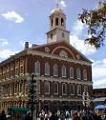

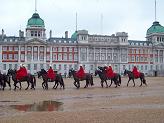

1742 And crown thy good with brotherhood? On Jan. 24 Charles VII Albert of Bavaria, head of the House of Wittelsbach finally gets his wish and is elected HRE Charles VII (1697-1745) (until Jan. 20, 1745), being crowned by his Wittelsbach brother Clemens (Klemens) August of Bavaria (1700-61), archibishop-elector of Cologne (who had been siding with the Austrian Hapsburg-Lorraine line until now); the only other Wittelsbach to become HRE was Louis IV way back in 1314-47; too bad, Bavaria is overrun with Austrian troops, which it takes the rest of his 3-year life to get rid of; meanwhile Karl Theodor (Charles Theodoe) (1724-99) of the Oberpfalz-Sulzbach line of the fractured Palatinate branch of the House of Wittelsbach becomes count-elector of the Palatinate (until 1799), becoming popular by supporting the arts and sciences, which positions him to inherit the how-I-met-your-mother Bavarian duchy in 1777. Put a wig and powder on white men and they all look alike? On Feb. 2 British PM (since Apr. 3, 1721) Robert Walpole resigns allegedly because of failing health (really his shrinking majority?), then on Feb. 6 accepts a peerage (earl of Orford not Oxford), and on Feb. 16 Spencer Compton, 1st Earl of Wilmington (1673-1743) (whom Robert Walpole had gotten raised to the peerage in 1728 in order to move him from the Commons to the Lords) becomes English PM #2 (until July 2, 1743), although the real leader of the Whig cabinet is John Carteret, 2nd Earl Granville (AKA Lord Granville) (1690-1763). On May 17 after Frederick II breaks the truce and enters Moravia "to pluck the Moravian hens", he wins a V at the Battle of Chotusitz (Czaslau), followed on May 24 by another at the Battle of Sahay (Zahájí) 10 mi. NW Budweis; on June 6 Maria Theresa agrees in the Peace of Breslau in Silesia to give Frederick the Silesian lands he has captured from her during the past 2 years in return for him recognizing her claim to the Austrian throne, ending the First Silesian War (begun 1740); she makes alliances with Savoy, Saxony and Britain; the Prussians leave Olmutz, leaving her free to turn her Austrian troops against the Bavarians and French; in June the French army led by Prince Charles occupies Prague, and becomes surrounded, then makes its escape on Dec. 16-26 - them Hessians always let their guard down around Christmas? On July 7 the Battle of Bloody Marsh (Marshes) on St. Simons Island, Ga. is a V for the British, led by Gen. James Oglethorpe over the Spanish, driving them back S to Fla. (St. Augustine) permanently. In Sept. the Ottoman gov. of Damascus sieges Arab Sheikh Daher el-Omar (1690-1775) in Tiberias for 83 days, until the departure of a Hajj caravan causes it to be lifted; he returns next July, but dies in Aug. of kidney disease, ending the threat. In Dec. the Battle of Augusta between white settlers of Va. and redskins, er, Indians leads to total white control within a couple of years. Tsarina Elizabeth sends an envoy to Finland offering measured autonomy as a Russian-controlled duchy, which only sparks nationalist sentiment. Cotton factories are first established in Birmingham and Northampton, England. The Williamite Wars over the Plantation of Ulster end; Ireland is at peace for a cent. so the rich can get richer while the poor get poorer? The ancient 440-mi. Indian Natchez Trace route between Nashville, Tenn. and Natchez, Miss. (linking the Cumberland, Tennessee, and Mississippi Rivers) is first used by a Euro, an unnamed Frenchman, and becomes a main Euro trade and transit route until the 19th cent. After inheriting it from an uncle when another of his nephews is disinherited for marrying, rich Huguenot Boston, Mass. merchant Peter Faneuil (1700-43) donates the 2-story (two rows of nine windows on each side, two rows of three windows on each end, and a grasshopper-shaped weather vane on top) Faneuil Hall (pr. FAN-ul) to Boston (built 1740-2); it ends up hosting so many meetings of rev. patriots that it becomes known as the "Cradle of Liberty". The Philadelphia Confession of Faith is pub. Arts-and-sciences-loving margrave (1735-63) Frederick the Beloved of Brandenburg-Bayreuth (1711-63) founds a univ. in his capital of Bayreuth, but after the students grow rebellious he transfers it on Nov. 4, 1743 to Erlangen, becoming Friedrich-Alexander U. of Erlangen-Nuremberg, named for him and its benefactor margrave (1757-91) Christian Frederick Charles Alexander "the Wild Margrave" of Brandenburg-Ansbach (1736-1806); famous students incl. Johann Ludwig Tieck, Wilhelm Heinrich Wackenroder, and Emmy Noether. Ex-German jurist Georg Heinrich Zincke (Zincken) (1692-1769) founds the economics periodical Leipziger Sammlungen von Wirthschafflichen-Policy-Cammer- und Finantz-Sachen (Leipzig Papers on Police, Economic, and Finance Matters) (until 1767). Peter Boehler is appointed bishop of the Moravian churches of Am., England, Ireland, and Wales. Viscount Bolingbroke returns to England, settling at Battersea (until 1751). Milan establishes a scale for accountants' fees. 17-y.-o. Jacques Casanova (1725-98) returns to Venice to find that his 14-y.-o. lover Lucia has run away and betrayed him; 16 years later (1758) he encounters her in an Amsterdam brothel and finds that she had contracted smallpox, which horribly disfigured her face, and ran away to spare him? - a new interview with Tonya Harding, the tough as nails skater? James Bradley (1693-1762) is appointed astronomer royal at Greenwich Observatory, succeeding Edmund Halley (b. 1656), who dies on Jan. 14. Jean-Jacques Rousseau (b. 1712) moves to Paris to promote a new system of musical notation he invented, but the Academie des Sciences rejects it - did you just say O snap? French-Canadian fur trader brothers Francois de La Verendrye (Vérendrye) (1715-94) and Francois Louis Joseph Gaultier de La Verendrye (Vérendrye) (1717-61) explore South Dakota (S.D.) (1742-3), and found the first white settlement there. Porto Alegre in Brazil is founded by settlers from the Azores (modern pop. 1.4M). The mango is introduced to Barbados from Rio de Janeiro. The first indoor swimming pool is opened in London. A canal linking Elbe and Havel is constructed. Cotton factories are established in Birmingham and Northampton. Kosta Boda glassworks in Swedens opens. Friedrich-Alexander U. is founded in Bayreuth, Bavaria, then moves to Huguenot-dominated Erlangen next year and becomes Erlangen U. Poor Richard's Almanack for 1742. William Kent (1685-1748) designs the Palladian-style Horse Guards Parade at Whitehall, London, which is built in 1751-3 by John Vardy. Inventions: English quaker Benjamin Huntsman (1704-76) invents the crucible process for casting steel. Science: Swedish astronomer Anders Celsius (1701-44) proposes the 0-100 Celsius (Lat. "centigrade" = 100 steps) temperature scale for use in lab work to the Royal Swedish Society, with 0 for the boiling point and 100 for the freezing point; in 1745 Carolus Linnaeus inverts it. On June 7 Prussian-born mathematician Christian Goldbach (1690-1764) proposes the Goldbach Conjecture, that every natural number greater than two can be expressed as the sum of two primes, and every natural number greater than five can be written as the sum of three primes; it is solved in ?. Nonfiction: Henry St. John, 1st Viscount Bolingbroke (1678-1751), A Letter on the True Use of Retirement; Letters on the Study of History. John Campbell, Lives of the Admirals. Etienne Fourmont, Grammatica Sinaica. Edmond Hoyle (1672-1769), A Short Treatise on the Game of Whist; becomes a hit, causing pirates to sell unauthorized eds., which Hoyle tries to override by autographing each copy for twopence, paid by his publisher Francis Cogan, who already paid him 100 guineas; it becomes the authoritative treatise on Whist until John Loraine Baldwin's work pub. in 1864; Hoyle follows with "A Short Treatise on the Game of Backgammon" (1743), "An Artificial Memory for Whist" (1744), "Treatise on Piquet" (1744), "Treatise on Chess" (1744), "Treatise on Quadrille" (1744), "Treatise on Brag" (1751), "Treatise on Probability Theory" (1754), and "Treatise on Chess" (1761), superseding "The Compleat Gamester" (1674); Cogan goes bankrupt in 1745, selling-out to Thomas Osborne, who pub. "Mr. Hoyle's Treatises of Whist, Quadrille, Piquet, Chess, and Back-Gammon" in 1748, calling it the 8th ed., becoming he std. English work on games, causing the phrase "According to Hoyle" to be launched. Colin Maclaurin (1698-1746), Treatise on Fluxions. Pierre de Maupertuis, Elements de la Geographie. John Oldmixon (1673-1742), Memoirs of the Press 1710-1740 (posth.). Thomas Simpson (1710-61), The Doctrine of Annuities and Reversions. Charles Viner, Legal Encyclopaedia (23 vols.) (1742-53). I. Walsh, Harmonia Anglicana; Or, The Musick of the English Stage: Containing six sets of ayers and tunes in 4 parts made for the operas, tragedys and comedyes of the Theater Royal; incl. "My Country 'Tis of Thee". Music: Karl Heinrich Graun (1704-59), Caesar and Cleopatra (July 12); introduces Italian opera to Berlin's new opera house. George Friedrich Handel (1685-1759), The Messiah (oratorio) (New Muck Hall, Dublin) (Apr. 13); composed in 24 days to save his flagging career, and performed by 26 boys and 5 men; this time he finds an audience of eager Bible-thumpers, Hallelujah, God save the king; the 1743 London debut is attended by George II, who stands up during the Hallelujah Chorus, leading some to surmise that he wasn't so moved by the music as tired and needing to stretch his legs; the first 7th-inning stretch? Art: Francois Boucher (1703-70), Diana Leaving Her Bath. William Hogarth (1697-1764), The Graham Children. Jean-Baptiste Oudry (1686-1755), The Gardens of Arcueil. Poetry: Thomas Gray (1716-71), Ode on a Distant Prospect of Eton College; "Where ignorance is bliss, 'tis folly to be wise". William Somerville (1675-1742), Field Sports; poem on hawking. Alexander Pope (1688-1744), The Dunciad, Book 4; pub. with a complete rev. of the 1st ed. (1728); Colley Cibber is the new King of Dunces. Edward Young (1683-1765), The Complaint; or Night Thoughts on Life, Death and Immortality (1742-5); took holy orders at age 50 after giving up his foolish youth, and finally this "melancholy and moonlight" pub. makes him an internat. star.; "By Nature's law, what may be, may be now;/ There's no prerogative in human hours. In human hearts what bolder thought can rise,/ Than man's presumption on to-morrow's dawn?/ Where is to-morrow? In another world"; "At thirty man suspects himself a fool,/ Knows it at forty, and reforms his plan;/ At fifty chides his infamous delay,/ Pushes his prudent purpose to resolve;/ In all the magnanimity of thought/ Resolves, and re-resolves, then dies the same." Novels: Claude Prosper Jolyot de Crebillon (1707-77), La Sopha, Conte Moral. Henry Fielding (1707-54), Abraham Adams. Births: German scientist and satirical writer, critic and aphorist George Christoph Lichtenberg (d. 1799) on July 1. Am. Cincinnati, Ohio co-founder John Cleves Symmes (d. 1814) on July 21 in Riverhead, Long Island, N.Y.; uncle of John Cleves Symmes Jr. (1780-1829); father-in-law of Pres. William Henry Harrison. Am. Rev. War Maj. Gen. Nathanael Greene (d. 1786) on Aug. 7 in Warwick, R.I.; namesake of Greensboro, N.C. Italian pope #251 (1800-23) Pius VII (Barnaba Niccolò Maria Luigi Chiaramonti) (d. 1823) on Aug. 14 in Cesena. U.S. supreme court justice (1789-98) (Presbyterian) James Wilson (d. 1798) on Sept. 14 in Carskerdo, Scotland; educated at the U. of St. Andrews, U. of Glasgow, and U. of Edinburgh; emigrates to the U.S. in 1766. French historian-mathematician Charles Francois Dupuis (d. 1809) on Oct. 26 in Trie-Chateau, Oise. English geographer-historian (oceanography pioneer) Maj. James Rennell (d. 1830) on Dec. 3 near Chudleigh, Devon. French Leblanc Process chemist Nicolas Leblanc (d. 1806) on Dec. 6 Issoudun, Indre. Prussian field marshal Prince Gebhard Leberecht von Blucher (Blücher) (d. 1819) on Dec. 16 in Rostock, Mecklenburg. German-Swedish chemist Karl (Carl) Wilhelm Scheele (d. 1786) on Dec. 19 (Dec. 9 Old Style) in Stralsund, W Pomerania. Persian Qajar shah #1 (1794-7) Agha Mohammad Khan (d. 1797); uncle of Fath Ali (1771-1834); castrated at age 6 by orders of Adil Shah in hopes of preventing him becoming a political rival, but it only makes him more calm, cool and collected? Mohwak Indian Chief (British ally) Joseph Brant (d. 1807), AKA Thayendanegea; son of Mohawk chief Niklaus Brant; grandson of Sa Ga Yean Qua Prah Ton, one of four Indian leaders to visit London in 1810; grows up in the Amsterdam, N.Y. household of fur trader Sir William Johnson (1715-74), supt. of Indian affairs N of the Ohio River 1755-74; his sister Molly becomes Johnson's common-law wife and bears him eight children. French hot air balloon pioneer Marquis Francois Laurent le Vieux d'Arlandes (d. 1809) in Anneyron, Duphine. Scottish pro-Vortigern antiquarian-writer George Chalmers (d. 1825) in Fochabers, Moray. Am. dentist John Woofendale (d. 1828) in England. Deaths: English astronomer Edmund Halley (b. 1656) on Jan. 14; his comet returns as predicted on Christmas Day, 1758 - wait, there's more, how about 1835 and 1910? German physician Friedrich Hoffmann (b. 1660) on Nov. 12 in Halle. English scholar-critic Richard Bentley (b. 1662). English South sea Bubble politician John Aislabie (b. 1670) on June 18. English historian John Oldmixon (b. 1673) on July 9. Italian composer-violinist Evaristo Felice dall'Abaco (b. 1675) on July 12. English poet William Somerville (b. 1675) on July 19 in Edstone, Worcestershire. Am. publisher Andrew Sowles Bradford (b. 1686). Dutch physicist Willem Jacob 's Gravesande (b. 1688) on Feb. 28. English poet John Hammond (b. 1710).



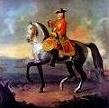



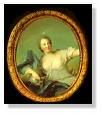






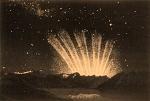

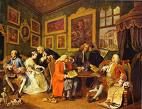

1743 On Jan. 1 the Verendrye brothers discover the Rocky Mts., and explore Wyoming (Wyo.); on their return they bury a lead plaque in Ft. Pierre, S.D., which is unearthed in 1913. On Mar. 14 the first recorded town meeting in America is held at Faneuil Hall in Boston, Mass. In May Maria Theresa retakes Bohemia and is crowned queen at Prague. On June 27 (June 16 Old Style) the 35K-man Pragmatic army of British, Hanover and Hesse troops under George II of Britain, Scottish field marshal John Dalrymple, 2nd Earl of Stair (1673-1747), and French-born Huguenot maj. gen. John (Jean Louis) Ligonier, 1st Earl Ligonier (1680-1770) (former gen. under Marlborough) (incl. Lord Jeffrey Amherst's First Regiment of Foot Guards)defeats 23K French troops under Adrien Maurice, 3rd Duc de Noailles (1678-1766) at the crummy Battle of Dettingen on the 18 mi. E of Frankfurt Main River on the Hesse-Bavaria border (modern-day Karlstein am Main), becoming the last time that a British sovereign personally leads his troops on the field (until ?), and won only by Ligonier's courageous improvisations and discipline; total casualties are 2K-3K British 4K-4.5K French; the HRE becomes a fugitive in Frankfurt; Frederick II the Great breaks the truce with Maria Theresa, allies with France and invades Bohemia; Austria allies with Saxony. On July 2 British PM (since Feb. 16, 1742) Spencer Compton, 1st earl of Wilmington (b. 1673) dies, and on Aug. 27 he is succeeded (until Mar. 6, 1754) as British PM by Whig Henry Pelham (1694-1754), younger brother of Thomas Pelham-Holles, Duke of Newcastle (1693-1768), with whom he shares power; Henry Pelham forces John Carteret to resign; quite quotable dude Philip Dormer Stanhope, 4th Earl of Chesterfield (1694-1773), known as Geffery Broadbottom in his press articles forms the Broadbottom Party, a coalition of anti-Walpole anti-George II cabinet members under Pelham. On Aug. 7 the Peace of Turku (Abo) gives control of all Finnish lands E of the Kymi River to Russia. The 1729 Gin Act raising the price of gin in a country where every sixth house is a saloon leads to the Gin Riots, after which the govt. backs off and lowers prices again; consumption soon rises to 8M gal. a year and the govt. gets antsy? - what they need now is a religious revival? Jewish pogroms begin in Russia. Scottish Covenanter minister Richard Cameron (1648-80) and his followers form the Reformed Presbyterian Church. Christopher Sower (Sauer) (Saur) (1695-1758) prints the first German Bible in Am. in Germantown, Penn. Indian yarns for the manufacture of fine textiles are first imported to Lancashire, England. The term "Tommy Atkins" is first used for a British soldier in a letter from Jamaica about a British troop mutiny: "Except for those from North America (mostly Irish Papists) ye Marimes and Tommy Atkins behaved splendidly". The 1729 Gin Act raising the price of gin in a country where every sixth house is a saloon leads to the Gin Riots, after which the govt. backs off and lowers prices again; consumption soon rises to 8M gal. a year and the govt. gets antsy? - what they need now is a religious revival? The city of Magnitogorsk (modern-day pop. 408K) is founded on the E side of the S Urals by the Ural River, named after 60%-iron-containing Mount Magnitnaya, launching iron ore production in 1759; in 1928 the Soviets travel to Cleveland, Ohio to meet with consulting co. Arthur G. McKee to discus plans to copy the U.S. Steel mill in Gary, Ind., also modeling their Magnitogorsk Iron and Steel Works after Pittsburgh, Penn.; in 1931 it is granted city status ; Motto: "The place where Europe and Asia meet". Newark Academy in Newark, Del. is chartered by William Penn's sons Thomas and Richard, changing its name to New Ark College in 1833, Delaware College in 1870, and Delaware U. in 1921. German immigrant Christopher Saur pub. a German language Bible, becoming the first Euro language Bible printed in North Am.; in 1763 he pub. the first Bible using paper manufactured in North Am.; in 1776 he pub. the first Bible printed from type manufactured in North Am. Poor Richard's Almanack for 1743. Sports: On Aug. 16 Broughton's Rules of Boxing are established in London by boxing champ Jack Broughton, with a 30-sec. knockout rule and no hitting or grasping below the waist; Broughton invents "mufflers", padded gloves for boxing. Architecture: A hand-operated elevator is installed in the palace of Versailles to allow Louis XV to go from his private apts. to those of mistress Marie Anne de Mailly, Madame de Chateauroux (1717-44) on the floor above him. The Frauenkirche in Dresden (begun 1726) finishes construction. Lawrence Washington (1718-52), elder half-brother and mentor of George Washington builds the 2-story 96-ft.-long 30-ft.-deep Mount Vernon mansion in Fairfax County, Va. on the Potomac River, named after his former boss British Adm. Edward "Old Grog" Vernon (1684-1757), who in 1740 ordered that sailor's rum should be watered-down, causing it to be called grog, from his habitual wearing of a grogram (silk-wool-gum taffeta) coat. Inventions: English mechanic John Wyatt of Birmingham designs the Compound Lever Weighing Machine for carts. Science: French mathematician-astronomer Alexis Claude Clairaut (1713-65) pub. a confirmation of Isaac Newton's prediction that the Earth is slightly oblate (flattened at the poles). The Klinkenberg-De Cheseaux Comet (Great Comet of 1744) is discovered on Dec. 9 by Dirk Klinkenberg (1709-99) of Haarlem, Netherlands, and again on Dec. 13 by Jean-Philippe Loys de Cheseaux (Chéseaux) (1718-51) of Lausanne, Switzerland; next Mar. it exhibits 6-7 tails and becomes brighter than Jupiter, becoming the largest recorded comet since the birth of modern astronomy (0.5 absolute magnitude), although the ancients saw a bigger 10-tailed comet in -1486. Nonfiction: Jean d'Anville (1697-1782), Map of Italy; corrects numerous errors, accompanied by a memoir showing his sources. Jean-Antoine Nollet (1700-70), Lecons de Physique Experimentale. Thomas Simpson (1710-61), Mathematical Dissertation on a Variety of Physical and Analytical Subjects. Music: Carlo Goldoni (1707-93), La Contessina (The Young Countess) (opera bouffe); music by Maccari. Georg Friedrich Handel (1685-1759), Samson (oratorio) (Feb. 18) (Covent Garden, London); libretto by Newburgh Hamilton; based on John Milton's "Samson Agonistes", which is based on Judges ch. 16. Art: Francois Boucher (1703-70), Madame Boucher; leaves her clothes on?; The Triumph of Venus; The Toilet of Venus; Daphnis and Chloe (1743-5). William Hogarth (1697-1764), Marriage a la Mode (6 scenes) (1743-5); his magnum opus?; the disastrous results of a marriage for money; incl. The Marriage Contract. Plays: Henry Carey (1692-1743), Chrononhotonthologos; "The most tragical tragedy that ever was tragediz'd by any company of tragedians"; opening line: "Aldiborontiphoscophornio! Where left you Chrononhotonthologos?" Carlo Goldoni (1707-93), La Donna di Garbo (The Fashionable Woman) (comedy). Voltaire (1694-1778), Merope (Mérope) (drama); "Who serves his country well has no need of ancestors." Novels: Henry Fielding (1707-54), Miscellanies (3 vols.); incl. The History of the Life of the Late Mr. Jonathan Wild the Great, A Journey from This World to the Next. Births: French mystical philosopher (Freemason) Louis Claude de Saint-Martin (d. 1803) (AKA Le Philosophe Inconnu or the Unknown Philosopher) on Jan. 18 in Amboise. Am. steamboat inventor John Fitch (d. 1798) on Jan. 21 in Windsor, Conn. English botanist (Freemason) Sir Joseph Banks, 1st Baronet (d. 1820) on Feb. 13 in London; educated at Harrow School, Eton, and Christ Church, Oxford U. Italian "The Celebrated Minuet" cellist-composer Luigi Rodolfo Boccherini (d. 1805) on Feb. 19 in Lucca. French mineralogist Abbe Rene Just Hauy (Haüy) (d. 1822) on Feb. 28 in Saint-Just-en-Chaussee, Oise; brother of Valentin Hauy (1745-1822). Swiss "Swiss Family Robinson" novelist Johann David Wyss (d. 1818) on Mar. 4. English "The Belle's Strategem" dramatist-poet Hannah Cowley (nee Parkhouse) (d. 1809) on Mar. 14 in Tiverton, Devonshire; daughter of a bookseller; wife of a Stamp Office official who abandons her in 1783 to join the British East India Co. U.S. 6'-2.5" Repub. pres. #3 (1801-9) and vice-pres. #2 (1797-1801) and inventor-architect and philosopher-writer-statesman and chocaholic (author of the DOI, co-creator of the 2-party system, founder of the U. of Va.) (Deist) Thomas Jefferson (d. 1826) on Apr. 13 [Aries] in Shadwell, Goochland (modern-day Albermarle County), Va.; has siblings who are fraternal twins; descendant of William Randolph; likes to write standing up; inventor of the dumbwaiter. English clergyman and power loom inventor Edmund (Edward) Cartwright (1743-1823) on Apr. 24 in Marham, Norfolk; educated at University College, Oxford U.; brother of John Cartwright (1740-1824). French physician and radical French Rev. leader Jean-Paul Marat (d. 1793) on May 24 in Boudry, Neuchatel, Switzerland; Calvinist father, Huguenot mother. Italian adventurer-occultist (Freemason) Count Alessandro di Cagliostro (Giuseppe Balsamo) (d. 1795) on June 2 in Palermo; the original snake oil salesman? German elector Wilhelm I of Kassel, Elector of Hesse (d. 1821) on June 3; eldest son of Frederick II (1720-85) and Princess Mary of Britain (1723-72) (daughter of George II); daddy converts to Roman Catholicism in 1747 and leaves mommy, who moves with her son to Denmark; sponsors Mayer Amschel Rothschild. Am. Rev. jurist-statesman-diplomat Francis Dana (d. 1811) on June 13 in Charlestown, Mass.; educated at Harvard U.; grandfather of Richard Henry Dana Jr. (1815-82). Am. jurist ("the Old Judge") John Lowell (d. 1802) on June 17 in Newburyport, Mass.; patriarch of the Boston Lowells; educated at Harvard U. English Romantic poet-writer Anna Laetitia Aikin Barbauld (d. 1825) on June 20. English utilitarian theologian-philosopher William Paley (d. 1805) on July ? in Peterborough; educated at Christ's College, Cambridge U. French mistress (of Louis XV) Comtesse du Barry (Marie Jeanne Bécu) (d. 1793) on Aug. 19 in Vaucouleurs, Lorraine; illegitimate daughter of Anne Becu and friar "Brother Angel". French chemist ("Father of Modern Chemistry") Antoine (Antoine-Laurent de) Lavoisier (d. 1794) on Aug. 26 in Paris; educated at the College Mazarin. Danish "The Wounded Philoctetes" neoclassical painter Nicolai (Nikolaj) Abraham Abildgaard (d. 1809) on Sept. 11 in Copenhagen; son of Soren Abildgaard (1718-91). French scientist-mathematician-biographer-encyclopedist-politician Marie Jean Antoine Nicolas de Caritat, Marquis de Condorcet (d. 1794) on Sept. 17. Italian opera buffa composer Giuiseppe Gazzaniga (d. 1818) on Oct. 5 in Verona; pupil of Niccolo Piccinni and Nicola Porpora. Danish poet (alcoholic) Johannes Ewald (d. 1781) on Nov. 18. German chemist-apothecary Martin Heinrich Klaproth (d. 1817) on Dec. 1 in Wernigerode; father of Julius Heinrich Klaproth (1783-1835). German lit. critic-historian Johann Joachim Eschenburg (d. 1820) on Dec. 7 in Hamburg; educated at the U. of Leipzig, and U. of Gottingen. French dancer Marie-Madeleine Guimard (d. 1816) on Dec. 27 in Paris. Am. Rev. War Col. Abram (Abraham) Penn (d. 1801) on Dec. 27 in Caroline County, Va.; ancestor of Robert Penn Warren (1905-89). Am. celeb Sarah "Sally" Franklin (Bache) (d. 1808); only daughter of Benjamin and Deborah Read Franklin (1705-74) (common-law marriage since 1730). Am. Shawnee chief Blue Jacket ((Wehyehpiherhsehnwah) (Weyapiersenwah) (d. 1810) in modern-day Ross County, Ohio. Scottish physician William Saunders (d. 1817). Am. Rev. War col. Charles McDowell (d. 1815) in Winchester, Va.; grows up in Burke County, N.C. Deaths: French cardinal and PM (1726-43) Andre Hercule de Fleury (b. 1653) on Jan. 29 in Issy-les-Moulineaux. French painter Hyacinthe Rigaud (b. 1659) on Dec. 29 in Paris. French painter Alexandre Francois Desportes (b. 1661). Italian celeb Anna Maria Luisa de' Medici (b. 1667) on Feb. 18 in Florence; last member of the Medici family of Florence; signs the Family Pact, bequeathing the Medici art collection to Tuscany; her bones are exhumed during the 1966 Florence Flood. English architect Thomas Archer (b. 1668). Italian violin maker Francesco Stradivari (b. 1671) on May 11. Dutch jurist Cornelius van Bynkershoek (b. 1673) on Apr. 16 in The Hague. English PM #2 (1742-3) Spencer Compton, 1st earl of Wilmington (b. 1673) on July 2 in St. James's Square, London; dies without heirs, making the Wilmington title extinct, although Del. and N.C. name cities in his honor. Italian composer Lodovico Giustini (b. 1685) on Feb. 7 in Pistoia. English poet-dramatist Henry Carey (b. 1687) on Oct. 5 in London (suicide after his son Charles dies). French painter Nicolas Lancret (b. 1690) on Sept. 14; produced 800 paintings - stay awake stay alive? English poet-musician Henry Carey (b. 1692). English poet Richard Savage (b. 1697) on Aug. 1 in Bristol.













1744 In Jan. 15-y.-o. Sophie Auguste Frederika of Anhalt-Zerbst (later known as Catherine II the Great), daughter of a petty German prince leaves her home in Stettin to travel to Russia on the invitation of Empress Elizabeth, and is betrothed to her creepy cousin Grand Duke Peter, heir to the Russian throne. On Apr. 6 (Easter weekend) after turning spiritual in 1741, Stockholm, Sweden-born Emanuel Swedenborg (Swedberg) (1688-1772) has his big spiritual awakening, claiming to be appointed by Jesus Christ to write "The Heavenly Doctrine" to reform Christianity and create a New Church by freely visiting Heaven and Hell to talk with angels and demons; he goes on to pub. 18 works which his Swedenborgian followers believe are divinely-inspired, incl. Heaven and Hell and its Wonders and Hell From Things Heard and Seen (1758), which claims that the last Judgment occurred in 1757. On May 30 after receiving Roman Catholic last rites, Alexander Pope (b. 1688) dies, along with all his many feuds, ending the Age of Pope and causing a reaction against poetry among the new-kid-on-the-block Romantics. On June 25-July 4 the Iroquois (Six Nations) negotiate the Treaty of Lancaster with Virginia Colony and Md. Colony in Lancaster, Penn., giving Va. to the whites up to the Blue Ridge Mts. In June Sir George Anson returns from his voyage around the world begun in 1740 after 3 years 9 mo. with only one ship and $2.5M worth of Spanish booty; for this loot, er, achievement he is promoted to rear adm. In Aug. Louis XV, who took personal command of the army in the spring offensive in the War of Succession and takes his babe Madame de Chateaureoux (b. 1717) along with him becomes seriously ill, sending her packing, allowing the French mobs to show their hatred for her by throwing rotten veggies at her carriage and hissing her, making her ill, and when he recovers and calls her back in Dec., she rises too quickly from her sickbed and dies of pneumonia; he vows to replace the ruined church of the Abbey of St. Genevieve in the Latin Quarter of Paris, entrusting Abel-Francois Poisson, Marquis de Marigny with the task, and in 1755 he commissions French architect Jacques-Germain Soufflot (1713-80) to design a new church, which begins construction in 1758, and is finished in 1790 in neo-classical style, with a facade modeled on the Pantheon in Rome, and a Bramante-style dome; in 1793 the U. of Douai is confiscated by the French revolutionaries, who turn the Church of St. Genevieve in Paris (built 1758-90) into the Pantheon (Panthéon). The Second Silesian War begins when Frederick the Great invades Bohemia; he takes Prague but is driven back to Saxony. King Louis XV of France declares war on George II of Great Britain and on Maria Theresa; King George's War in North Am. begins; the French briefly occupy Annapolis, Nova Scotia. Bagrationi monarch Erekle (Heraclius) (Erekli) (Irkaly) II (1720-98) becomes next-to-last king of Kakheti (until 1762), followed by king of Kakheti and Kartlin in E Georgia in 1762-98, fighting a long losing battle to stave off Persian invasion by allying with Russia. Adolphus Frederick, heir to the Swedish throne marries Princess Ulrica, daughter of Frederick II the Great. Mohammed Ibn Saud and his Sa-Udi family are won over by Najd-born radical unitarian Sunni Arab theologian Wahhabism founder Muhammad (Mohammed) ibn Abd al-Wahhab at-Tamimi (1703-92), and found the First Saudi State in Arabia. After Jesuit priest Gaspar Morales refuses to give a Christian burial to his brother for specious reasons, Francisco Dagohoy (Sendrijas) ("Dagon Sa Hoyohoy" = talisman of the breeze) of Bohol kills Italian Jesuit curate Father Giuseppe Lamberti and Father Morales, beginning the Dagohoy Rebellion in the Philippines against the Spanish govt. (ends 1829), holing up with 3K-20K followers in the trick (underwater passage to the outside) Francisco Dagohoy Cave in the mountains in the town of Danao, and holding on for a record 20 Spanish govs.-gens. and 85 years. Future "British conqueror of India" Robert Clive (1725-74) arrives in India at age 18 broke and rejected by his father (who calls him the Booby), and takes a job as a clerk for the British East India Co.; one day fellow clerk Edmund Maskelyne enters his room to find him holding a pistol; Clive asks him to fire it out the window, and when he does, remarks "I must be reserved for something. That pistol I have twice snapped at my own head." Cotopaxi volcano in Ecuador erupts again (last time 1698), the noise heard 500 mi. away at Honda, Colombia. Eliza Haywood (Fowler) (1693-1756) begins pub. The Female Spectator, the first women's periodical to be edited by a woman; predictably, all her stuff is icily received by the male establishment, Alexander Pope calling her a "shameless scribbler", and Jonathan Swift calling her a "stupid, infamous, scribbling woman". The Madrigal Society is founded in London, holding weekly meetings in taverns. Poor Richard's Almanack for 1744. Sports: The Honorable Co. of Edinburgh Golfers, the world's first golf club is founded. The first recorded Cricket match pits Kent vs. All England at the Artillery Ground in London, with the first known code of cricket drawn up by "Noblemen and Gentlemen", who bet large sums on the former kiddie game; the pitch is set at 22 yards, the distance between bowling crease and popping crease at 46", the wicket at 22" tall and 6" wide, and the ball at 5-6 oz. Inventions: Benjamin Franklin invents the cast-iron Franklin Stove, which stands away from the walls and looks like a chimney; it is redesigned in 1790 by David R. Rittenhouse so that it actually works. Science: Spanish scientists slash naval officers Antonio de Ulloa (1716-95) and Jorge Juan y Santacilia (1713-73), who went on the La Condamine expedition to South Am. in 1736 then remained, discover sizable stores of the element Platinum (Pt) (#78) (Sp. "platina" = little silver), and take some back to Europe with them on separate ships; too bad, Ulloa's ship is captured by the Brits, but after the scientists pull their increasingly powerful internat. strings he ends up a fellow of the Royal Society of London - what's it good for, doorstops? Jean Philippe Loys de Cheseaux (Chéseaux) (1718-51) of Lausanne, Switzerland first states Olbers' Paradox, that the night sky can't be dark if the Universe is infinite. Swiss mathematician Leonhard Euler (1707-83) discovers the Calculus of Variations. Nonfiction: Anon., Tommy Thumb's Pretty Song Book; earliest surviving collection of English nursery rhymes; incl. Baa Baa Black Sheep, Hickory Dickory Dock, Ladybird Ladybird, Little Robin Redbreast, Little Tommy Tucker, London Bridge is Falling Down (My Fair Lady), Mary Mary Quite Contrary, Sing a Song of Sixpence, Who Killed Cock Robin?. Jean Baptiste le Rond d'Alembert (1717-83), Traite de l'Equilibre et du Mouvement des Fluides (Treatise on the Equilibrium and Movement of Fluids); introduces the components of fluid velocity and acceleration, differential requirements for continuity, and complex numbers, deriving the paradox of zero longitudinal force on the body. George Berkeley (1685-1753), Siris: A Chain of Philosophical Reflexions and Inquiries Concerning the Virtues of Tar-Water and Divers Other Subjects Connected Together Arising One from Another. Benjamin Franklin (ed), Cicero's 'Cato Major' (Phila.). Pierre Francois Xavier de Charlevoix (1682-1761), Histoire et description generale de la Nouvelle France, avec le journal historique d'un voyage fait par ordre du roi dans l'Amérique septentrionnale (3 vols.). Ludvig Holberg (1684-1754), Moral Reflection. Dr. Samuel Johnson (1709-84), An Account of the Life of Mr. Richard Savage, Son of the Earl Rives; pub. anon.; his first major bio.; about his London poet friend, who just died; claims that he was the illegitimate child of a noble family that disowned him; throws light on Johnson's own hardships. Lodovico Antonio Muratori, Annali d'Italia (1744-9). The first Eskimo Trans. of the Bible is pub. in Copenhagen. Music: J.S. Bach (1685-1750), The Well-Tempered Clavier, Pt. 2 (Das wohltemperierte Klavier). Christoph Gluck (1714-87), Iphigenie en Aulide (opera) (Paris); not to be confused with "Iphigenie et Tauride" (1779). G.F. Handel (1685-1759), Semele (HWV 58) (oratorio) (Theatre Royal, London) (Feb. 10); stars Elisabeth Duparc as Semele, Esther Young as Juno, and John Beard as Jupiter; tries to push an opera over as an oratorio, but the audience isn't fooled, getting pissed off at its amorous pagan theme instead of a prudish Biblical theme for Lent, rubbed in by being in English instead of Italian, causing it to flop after 4 performances, after which he gets two more in Dec. by censoring it - that's right, it flops for having sex in it? Art: John Michael Rysbrack, Dr. Radcliffe of Oxford (sculpture); ends up in the Radcliffe Camera library at Oxford U. Novels: John Newbery (1713-67) and M.F. Thwaite, A Little Pretty Pocket-Book, Intended for the Amusement of Little Master Tommy and Pretty Miss Polly with Two Letters from Jack the Giant Killer; the first children's book; sold with a ball for boys and a pincushion for girls; a bestseller, launching his career in children's lit., causing him to be called "the Father of Children's Literature"; printed in Colonial Am. in 1762; the first reference to rounders ("base-ball"). Births: Am. engineer-soldier Col. ("Father of Am. Civil Engineering") Loammi Baldwin (d. 1807) on Jan. 10 in Woburn, Mass.; educated at Harvard U.; promoter of the Baldwin apple. Am. Penn. gov. #1 (1790-9) Thomas Mifflin (d. 1800) on Jan. 10 in Philadelphia, Penn.; educated at the College of Philadelphia. German archbishop of Mainz (1802-17) Karl Theodor Anton Maria von Dalberg (d. 1817) on Feb. 8 in Herrnsheim. English historian William Mitford (d. 1827) on Feb. 10 in Exbury (near Beaulieu); educated at Queen's College, Oxford U.; friend of Edward Gibbon (1737-94). English poet laureate (1790-1813) Henry James Pye (d. 1813) on Feb. 10 in London. Am. Rev. leader and atty. Josiah Quincy II (d. 1775) on Feb. 23 in Boston, Mass.; son of Josiah Quincy Sr. (1709-84); father of Josiah Quincy III (1772-1864); educated at Harvard U. German trader-banker (Jewish) ("Founding Father of International Finance") Mayer (Meyer) Amschel (de) Rothschild (Ger. "red shield") (Bauer) (d. 1812) on Feb. 23 in Frankfurt; founder of the Rothschild internat. banking house; father of five sons incl. Nathan Mayer Rothschild (1777-1836), whom he places in key positions to set up banks in Frankfurt, Vienna, London, Naples, and Paris, dominating the banking industry by the mid-1800s after making a fortune by financing the Napoleonic Wars; secret founder of the Illuminati?; the Red Shield is actually the origin of the Star of David? Am. Dem.-Repub. Mass. gov. #7 (1807-8) James Sullivan (d. 1808) on Apr. 22 in Berwick, Mass. (modern-day Maine); brother of John Sullivan (1740-95). French gen. Henri Christian Michel de Stengel (d. 1796) on May 11 in Neustadt an der Weinstrasse, Bavaria. British queen consort (1761-1818) and breed mare Charlotte of Mecklenburg-Strelitz (d. 1818) on May 19 in Mirow, Meclenburg-Strelitz; youngest daughter of Duke Charles Louis Frederick of Mecklenburg-Strelitz (1707-52) and Elizabeth Albertine of Saxe-Hildburghausen, duchess of Saxony (1713-61); wife (1761-) of George III (1738-1820); of a ducal-princely not royal line; mother of 15 children, incl. George IV (1762-1830), Frederick, Duke of York and Albany (1763-1827), William IV (1765-1837), Charlotte of Wurttemberg (1766-1828), Edward, Duke of Kent and Strathearn (1767-1820), Augusta Sophia (1768-1840), Ernest Augustus I (1771-1851), Augustus Frederick, Duke of Sussex (1771-1843), Adolphus, 1st Duke of Cambridge (1774-1850), Sophia (1777-1848). English engraver-writer Samuel Ireland (d. 1800) on May 21 in London; father of "Vortigern" William Henry Ireland (1775-1835). British army maj. Patrick Ferguson (d. 1780) one June 4 (May 25 Old Style) in Edinburg, Scotland. Am. Repub. gerrymandering politician (Gov. of Mass.), statesman, DOI signer and vice-pres. #5 (1813-14) Elbridge Gerry (d. 1814) (pr. with hard g) on July 17 in Marblehead, Mass.; educated at Harvard U. grandfather of Elbridge Thomas Gerry (1837-1927). French naturalist (invertebrate zoologist and taxonomist) Jean-Baptiste Pierre Antoine de Monet, Chevalier de Lamarck (d. 1829) on Aug. 1 in Bazentin, Picardy; an 11th child; coiner of the terms "invertebrates" and "biology"; founder of Lamarckism, the theory of organic evolution that acquired characteristics can be inherited - e.g., Ahnuld's kids should be born with big biceps? German Volksgeist nationalist Sturm und Drang poet-philosopher and Lutheran pastor Johann Gottfried von Herder (d. 1803) on Aug. 25 in Mohrungen, East Prussia (modern-day Morag, Poland); educated at the U. of Konigsberg (Kalingrad); student of Immanuel Kant; protege of Johann George Hamann; inspiration for Goethe to launch the Sturm und Drang movement in 1771; preaches that every nat. group has its own particular spirit and genius - is its own god-freed herd? French Palladian architect (in Italy) Giacomo Quarenghi (d. 1817) on Sept. 20/21 in Rota d'Imagna (near Bergamo); student of Anton Raphael Mengs, Stefano Pozzi, and Paolo Posi (1708-76). Prussian king #4 (1786-97) Frederick William II (d. 1797) on Sept. 25 in Berlin; son of Prince Augustus William (1722-58) (2nd son of Frederick William I). Canadian businessman (founder of McGill U.) James McGill (d. 1813) on Oct. 6 in Glasgow, Scotland; educated at the U. of Glasgow; emigrates to Canada in 1766. U.S. First Lady #2 (1797-1801) (fashion and society trend-setter) Abigail Smith Adams (d. 1818) on Nov. 11 in Weymouth, Mass.; daughter of Congregational Rev. William Smith and Elizabeth Quincy, descendant of Puritan preacher Thomas Shepard of Cambridge, and English king Edward I Longshanks (1239-1307); wife (1764-) of pres. John Adams (1735-1826). Am. politician-jurist Richard Peters Jr. (d. 1828) on June 22 in Philadelphia, Penn.; son of William Peters (1702-86); nephew of Richard Peters (1704-76); educated at the U. of Penn. Deaths: English queen's blackbottom girl (bedchamber reject) Sarah Churchill (b. 1660). Italian philosopher Giovanni Battista Vico (b. 1668) on Jan. 23 in Naples. English MP James Brydges, 1st duke of Chandos (b. 1673) on Aug. 4; dies heavily in debt, causing his Cannons estate to be demolished in 1747 and the contents auctioned. Am. Va. planter William Byrd II (b. 1674) on Aug. 26. German prince-archbishop of Salzburg (1727-44) Count Leopold Anton von Firmian (b. 1679) on Oct. 22 in Salzburg, Austria. English poet Alexander Pope (b. 1688) on May 30 in Twickenham: "A little learning is a dangerous thing;/ Drink deep, or taste not the Pierian spring; There shallow draughts intoxicate the brain,/ And drinking largely sobers us again" [Pieria, Macedonia was home to the Muses]; "What mighty contests rise from trivial things"; "To err is human, to forgive divine"; "The proper study of mankind is man"; "Fools rush in where angels fear to tread"; "Hope springs eternal in the human breast"; "True wit is nature to advantage dressed;/ What oft was thought, but ne'er so well expressed"; "The great moral poet of all times, of all climes, of all feelings, and all stages of existence." (Lord Byron) English playwright Lewis Theobald (b. 1688) on Sept. 18. Italian violin maker Giuseppe Guarneri (b. 1698) on Oct. 17. Swedish astronomer Anders Celsius (b. 1701) on Apr. 25 in Uppsala (TB). Indian sage Thayumanavar (b. 1706).







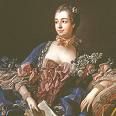





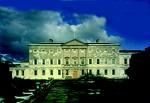

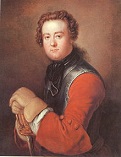



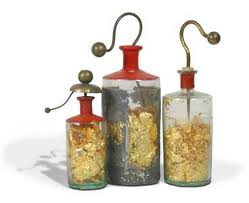
1745 On Jan. 20 HRE Charles VII (b. 1697) dies, and his eldest son Maximilian III Joseph (1727-77) becomes elector of Bavaria (until 1777), but is in no position to fuss with the the Austrian armies invading his country, and abandons all fussy imperial pretentions for the House of Wittelsbach, signing on Apr. 22 the Treaty of Fussen (Füssen) in Bavaria; on Sept. 13 Maria Theresa's husband Francis Stephen is elected at Frankfurt am Main, and crowned HRE Francis I (1708-65) on Oct. 4, founding the House of Hapsburg-Lorraine as the imperial house of Austria (and later Hungary), which goes on to produce such credit-cards-that-got-no-limit-dress-my-ass-with-the-latest-fashion big rock stars as his daughters (by Maria Theresa) Marie Antoinette (wife of Louis XVI of France), Maria Luise (wife of Napoleon I), and Emperor Maximilian I of Mexico. On May 11 the French under marshal Maurice, Comte de Saxe (Moritz von Sachsen) (Marechal de Saxe) (1696-1750) defeat the British, Dutch, and Austrians under the command of George II's incompetent younger son William (Wilhelm) Augustus, Duke of Cumberland (1721-65) at the Battle of Fontenoy in Flanders, after whiskey-guzzling Scot Lord Charles Hay (1705-60) of the First Foot Guards first dashes forward and drinks a toast, shouting to the Gardes Francaises, "Gentlemen of France, fire first", the humiliation getting rubbed in when their lines are broken by the Irish Brigade, after which he ends up in an asylum by next year, then becomes George II's aide-de-camp in 1749, finally getting arrested in 1757 for criticizing his superiors; Saxe, who was naturalized as a French subject in Apr. is carried in a wicker chariot because he has edema and can't sit on a horse; the French then go on to conquer the Austrian Netherlands, becoming France's last great military V before the French Rev. In May Bavaria, Saxony, and Austria agree to reduce Prussia to its former condition as the electorate of Brandenburg; too bad, Frederick II has other ideas, and on June 4 he wins a V at the bloodbath Battle of Hohenfriedberg, and another in Sept. at the Battle of Soor-Trautenau, and one more on Dec. 14-15 at the Battle of Kesselsdorf. On June 16 a British force of 4.2K under Mass. gov. William Shirley and Kittery merchant Sir William Pepperell, 1st Baronet (1696-1759) (who also finances the expedition) takes supposedly impregnable Ft. Louisburg in Cape Breton, Nova Scotia, Canada after a 49-day siege, but three years later at Aix-la-Chapelle the fort is stupidly returned under a peace treaty in exchange for Madras, because the British need Quebec for firewood; Nathaniel Hawthorne later eulogizes Pepperell as "The mighty man of Kittery". On July 25 Roman Catholic "Young Pretender" Charles Edward Stuart (Stewart) (Bonnie Prince Charlie) (1720-88) (grandson of James II) lands on Eriskay Island in Scotland, proclaims his father as James VIII of Scotland and James III of England, and raises the Highlanders, beginning the Second Jacobite Rebellion (Jacobite Rising of 1745); on Sept. 17 the Scots win a V over royalist John Campbell, duke of Argyll (Argyle) at the Battle of Prestopans near Edinburgh; the Scottish army advances as far S as Derby but retreats when no English come to their aid; Bonnie Prince Charlie's landing in Scotland popularizes the song God Save the King/Queen. On Aug. 25 Grand Duke Peter of Russia marries Princess Catherine (future Catherine II the Great), previously known as Sophia (Sophie). On Sept. 15 Jeanne Antoinette Poisson, Madame (Marquise) de Pompadour (1721-64) becomes Louis XV's official mistress; she lasts 19 years even though she is frigid, because she combines the brains of a diplomat, the conversational abilities of a raconteur, and the entertainment sense of a Martha Stewart, plus she is good at finding the king young, nubile bed partners who have none of these qualities? On Dec. 25 after the French fail to aid Prussia as promised, causing Frederick II to retreat to Silesia, while the English subsidize Maria Theresa and provide her with troops, then withdraw, the Peace (Treaty) of Dresden is signed in Dresden, Saxony, confirming Austrian secession of Silesia to Prussia, while Prussia recognizes the Pragmatic Sanction, ending the Second Silesian War. Shogun (since 1716) Tokugawa Yoshimune (b. 1684) dies, and Tokugawa Iyeshige (Ishege) (-1760) (a paralytic who has trouble speaking) becomes Tokugawa shogun #9 of Japan (until 1760). Ngwane III (-1780) becomes the first king of modern Swaziland (until 1780), which is called Kangwane. Lord Chesterfield becomes lord lt. of Ireland (until 1746), and his admin. becomes known for tolerance. Lord Jeffrey Amherst is promoted to lt. col., and appointed aide to the duke of Cumberland. Frederick, Md. (Frederick Town), named after Frederick Calvert, 6th Baron Baltimore (Frederick II the Great?) is settled by German Rhineland Palatinate immigrants, later becoming the initial stop for the Pennsylvania Dutch, after which they migrate through the Shenandoah Valley to W Piedmont in N.C. After sailing to Bering Island in 1743, Russian Cossack explorer Emelian Basov explores the Aleutian Islands. In England the Co. of Barbers and Surgeons (formed 1540) splits up as the surgeons seek to distance themselves from their lowly "basin barber" brethren, and establish the Co. of Surgeons in London (until 1800); the barbers get the pole, which represents bloody rags hung out to dry, topped by a brass basin to catch the blood during bloodletting; in 1800 it becomes the Royal College of Surgeons of England. After young British lt. Baker Phillips is court martialed and shot for surrendering a ship after his captain brings it into battle unprepared and is killed, the double standard causes a public outcry leading to the Articles of War being amended to make "failure to do one's utmost" a capital crime for officers of all ranks. Benjamin Franklin founds the Am. Philosophical Society "for the promotion of useful knowledge among the British plantations in America", becoming the oldest learned society in Am.; its members later incl. 15 DOI signers, 18 members of the Constitutional Convention, and 13 U.S. presidents. Gaming is prohibited in Bath, England, ruining big dandy MC Richard "Beau" Nash (1674-1761), who ends up living on a pathetic pension. Benjamin Franklin pub. Advice to a Young Man on the Choice of a Mistress, claiming that marriage is "the proper remedy" for sexual urges, but that if a man finds "sex inevitable", he should "prefer old women to young ones" for eight reasons, the final one being "they are so grateful". The number of newspapers in British America reaches 22: 7 in New England, 10 in the middle colonies, and 5 in the south. Poor Richard's Almanack for 1745. Gerard van Swieten (1700-72), founder of the Viennese School of Medicine becomes court physician to Maria Theresa. In the marriage of the year, French playwright Charles Simon Favart (1710-92) marries Opera-Comique singer-dancer Justine Benoite Duronceray (1727-72), and they go to Flanders to perform for the troops of Marshal de Sax fighting in the War of Austrian Succession, where they are so popular that enemy troops are granted leave to attend; they go on to produce over 100 comedies and operettas at the Opera-Comique, usually written by him and starring her. Middlesex Hospital in London, England is founded, causing great controversy over the idea of lying-in? The first Oddfellows (Odd Fellows) Lodge in England is founded at the Globe Tavern in Hatton Garden. The quadrille becomes a fashionable dance in France. Yale College in Conn. receives a new royal charter. Architecture: The Georgian Leinster House (originally Kildare House) in Dublin, Ireland is begun by James Fitzgerald, earl of Kildare, and designed by Kassel, Germany-born Irish architect Richard Castle (Cassels) (1690-1751) (finished 1747); it is later used as the model for the U.S. White House. The Rococo Sanssouci (Fr. "without a care") Palace in Potsdam (near Berlin), Prussia is begun by Frederick II the Great to rival Versailles as his summer home, designed by Prussian architect Georg Wenzeslaus von Knobelsdorff (1699-1753) and Dutch architect Jan Bouman (1706-66) (finished May 1, 1747); it ends up as a 1-story 10-room villa that rivals Chateau de Marly not Versailles, causing his successors to enlarge it. Inventions: French robot toy whiz Jacques de Vaucanson (1709-82), who was appointed by Cardinal Fleury in 1741 as French inspector of silk manufacture invents a Punch-Card Controlled Drawloom (the first completely automated loom) in an effort to help French industry catch up with England and Scotland; too bad, the Luddites shut him down, and he gives up on robots. Science: English farmer Robert Bakewell (1725-95) of England pioneers Systematic Stock Breeding (Animal Husbandry) - good stock we must bake well? The Leyden Jar, the biggest electrical breakthrough of the 18th cent. is discovered independently by Canon Ewald Georg von Kleist (1700-48) of Kamin, Pomerania (Oct. 11, 1745) and Cornelius Pieter (Petrus) van Musschenbroek of the U. of Leyden in Holland (Jan. 1746), giving it its name. Nonfiction: Germain Boffrand (1667-1754), Livre d'Architecture; attempts to strike a balance between French academic classicism, Italian Baroque, and his new Louis XV Rococo. Charles Bonnet (1720-93), Traite d'Insectologie. Denis Diderot (1713-84), Essai sur le Merite de la Vertu; "From fanaticism to barbarism is only one step." Philip Doddridge, The Rise and Progress of Religion in the Soul. Dr. Samuel Johnson (1709-84), Observations on the Tragedy of Macbeth. James Logan, The Clans of the Scottish Highlands. Pierre Louis Moreau de Maupertuis (1698-1759), Venus Physique (The Earthly Venus); challenges the preformation theory of genetics, proposing development of life from a common ancestor, and announcing the take-a-chance-on-me Principle of Least (Stationary) Action. Thomas Simpson (1710-61), A Treatise of Algebra. Jonathan Swift (1667-1745), Directions to Servants in General; Further Thoughts on Various Subjects; "Vision is the Art of seeing Things invisible." William Whiston (1667-1752), Primitive New Testament. Music: J.S. Bach (1685-1750), Gloria in Excelsis Deo (Cantata 191); composed to celebrate the Peace of Dresden, and performed on Christmas Day, the date of the treaty. William Boyce (1710-79), Lyra Britannica (6 vols.) (1745-). The Scottish nat. song The Campbells Are Coming (Baile Inneraora) is pub. Art: Pompeo Batoni (1708-87), Achilles at the Court of Lycomedes. Francois Boucher (1703-70), Spring (La Toilette Pastorale); Bacchus and Erigone. William Hogarth (1697-1764), Self-Portrait with Pug Dog. Giovanni Battista Tiepolo (1696-1770), Antony and Cleopatra (Labia Palace, Venice). Plays: Carlo Goldoni (1707-93), Arlecchino Servitore di Due Padroni (Harlequin Servant of Two Masters) (comedy); I Due Gemelli Veneziani (The Two Venetian Twins) (comedy). James Thomson (1700-48), Tancred and Sigismunda (tragedy). Births: Am. Rev. War Gen. "Mad" Anthony Wayne (d. 1796) on Jan. 1 in Chester County, Penn. Danish entomology pioneer Johan Christian Fabricius (d. 1808) on Jan. 7 in Tonder, Schleswig; educated at the U. of Copenhagen; student of Carl Linnaeus. Dutch surgeon-scholar-Japanologist Isaac Titsingh (d. 1812) on Jan. 10 in Amsterdam. English "Sacred Dramas" religious writer, poet-dramatist and philanthropist Hannah More (d. 1833) on Feb. 2 in Stapleton (near Bristol). Italian physicist Alessandro Volta (d. 1827) on Feb. 18 in Como. English explorer (N Canada) Samuel Hearne (d. 1792) in Feb. in London. English "Tom Bowling" dramatist-novelist-actor-musician Charles Dibdin (d. 1814) on Mar. 4 in Southampton; youngest of 18 children; brother of Capt. Thomas Dibdin; educated at Winchester School; father of Charles Dibdin the Younger (1768-1833) and Thomas John Dibdin (1771-1841); coiner of the word "circus"? Polish Gen. (Freemason) ("Father of the American Cavalry") Casimir Pulaski (d. 1779) on Mar. 6 in Warsaw. Am. Rev. leader and U.S. chief justice #3 (1796-1800) Oliver Ellsworth (d. 1807) on Mar. 8 in Windsor, Conn.; educated at Yale College, and Princeton U.; coiner of the term "United States". English MP-diplomat and spymaster William Eden, 1st Baron Auckland (d. 1814) on Apr. 3; son of Sir Robert Eden; educated at Eton Collegem and Christ Church, Oxford U.; father of George Eden, 1st earl of Auckland (1784-1849). Am. Rev. War hero William Dawes Jr. (d. 1799) on Apr. 6 in Boston, Mass. French physician Philippe Pinel (d. 1826) on Apr. 20 in Jonquieres. German-Bohemian violinist-composer Carl (Karl Philipp) Stamitz (Karel Stamic) (d. 1801) on May 7 in Mannheim; son of Johann Stamitz (1717-57). Danish portraitist Jens Juel (d. 1802) on May 12 in Funen Island. Am. theologian Jonathan Edwards Jr. (d. 1801) on May 26 in Northampton, Mass.; 2nd son of Jonathan Edwards Sr. (1703-58); educated at Princeton U. English "English Grammar", "English Reader" writer (Quaker) Lindley Murray (d. 1826) on June 7 in Lebanon County, Penn; son of Robert Murray (1721-86) and Mary Lindley Murray (1726-82); emigrates to the U.S. in 1784; best-selling author on Earth in the first half of the 19th cent. until the McGuffy Readers come along in 1836. Am. Rev. War soldier U.S. state secy. #3 (1795-1800) Timothy Pickering (d. 1829) on July 17 in Salem, Mass.; educated at Harvard U. English architect Henry Holland (d. 1806) on July 20 in Fulham, London. Scottish "The Man of Feeling" novelist-playwright ("the Addison of the North") Henry Mackenzie (d. 1835) on July 26 in Edinburgh; educated at the U. of Edinburgh. Irish musical antiquarian (founder of Fitzwilliam Museum, Cambridge) Richard FitzWilliam, 75th Viscount FitzWilliam (d. 1816) on Aug. 1. Swedish chemist-metallurgist Johan Gottlieb Gahn (d. 1818) on Aug;. 19 in Voxna Bruk, Halsingland; educated at the U. of Uppsala. Am. Methodist Episcopal bishop (first ordained in the U.S.) Francis Asbury (d. 1816) on Aug. 20 in Hampstead Bridge, Staffordshire, England; emigrates to the U.S. in 1771. Am. Rev. War gen. and Dem.-Repub. Tenn. politician John "Nolichucky Jack" Sevier (d. 1815) (pr. like severe) on Sept. 23 in New Market, Rockingham County, Va.; of French Huguenot and English stock; descendant of St. Francis Xavier; only gov. of Franklin (1785-9); Tenn. gov. #1 (1796-1801) and #3 (1803-9); brother of Valentine Sevier, ancestor of Tennessee Williams (1911-83). French blind educator Valentine Hauy (Haüy) (d. 1822) on Nov. 13 in Saint-Just-en-Chaussee, Oise; brother of Rene Just Hauy (1743-1822). English "The Road to Ruin" dramatist-writer Thomas Holcroft (d. 1809) on Dec. 10 in Leicester Fields, London; starts out as a stableboy. Am. statesman and U.S. supreme court chief justice #1 (1789-95) John Jay (d. 1829) on Dec. 23 in New York City; educated at Columbia U. (King's College). Am. Rev. leader, gov. #2 of N.J. (1790-3), and U.S. Supreme Court justice #8 (1793-1806) William Paterson (d. 1806) on Dec. 24 in County Antrim, Northern Ireland; emigrates to the U.S. at age 2; educated at Princeton U. Am. Rev. leader and physician (DOI signer) (abolitionist) ("Founder of Am. Psychiatry") Dr. Benjamin Rush (d. 1813) on Dec. 24 in Byberry Township, Penn.; father of Richard Rush (1780-1859); educated at Princeton U.; founder of Dickinson College in Penn.; believes that being black is a hereditary disease called negroidism (negritude), and counsels against spreading the disease via racemixing with whites. French musician-swordsman-equestrian (black) ("the Black Mozart") ("the Voltaire of Music") Joseph Bologne, Chevalier de Saint-Georges (d. 1799) on Dec. 25 in Guadeloupe; white noble plantation owner father Guillaume-Pierre Tavernier de Boullogne, black African former slave mother Nanon. Spanish naval explorer Juan Manuel de Ayala y Aranza (d. 1797) on Dec. 28 in Osuna, Andalucia. U.S. jurist Robert Hanson Harrison (d. 1790) in Charles County, Md. British anti-slavery activist (black) Olaudah Equiano (Gustavus Vassa) (d. 1797) in Essaka, Nigeria. French balloonist Jacques Etienne (Étienne) Montgolfier (d. 1799) in Annonay (near Lyons); brother of Joseph Michel Montgolfier (1740-1810); son of a paper manufacturer; co-inventor of the first practical hot air balloon (paper filled with smoke). Am. Navy Commodore ("Father of the U.S. Navy") John Barry (d. 1803) in Tacumshane, County Wexford, Ireland. Russian field marshal Mikhail Ilarionovich Kutuzov (Kutusov) (d. 1813). Austrian bishop of Linz #3 (1809-25) Sigismund Ernst Hohenwart (d. 1825). Deaths: Irish soldier James Butler, 2nd duke of Ormonde (b. 1665) in exile in Spain. Irish writer Jonathan Swift (b. 1667) on Oct. 19 in Dublin; his hatred of mankind causes him to go insane?; buried next to his secret wife Stella: "There are few, very few, that will own themselves in a mistake, though all the World sees them to be in downright nonsense"; "'Tis very warm weather when one's in bed"; "Falsehood flies, and Truth comes limping after it"; "We are so fond of one another, because our ailments are the same"; "I love good credible acquaintance; I love to be the worst of the company"; "One enemy can do more hurt, than ten friends can do good"; "Reason is a very light rider and easily shook off"; "Hail fellow, well met"; "How we apples swim!"; "But nothing is so hard for those who abound in riches, as to conceive how others can be in want"; "Proper words in proper places, make the true definition of style"; "Reasoning will never make a man correct an ill opinion, which by reasoning he never acquired"; "If Heaven had looked upon riches to be a valuable thing, it would not have given them to such a scoundrel"; "So weak thou art, that fools thy power despise;/ And yet so strong, thou triumph'st o'er the wise"; "We have just enough religion to make us hate, but not enough to make us love one another"; "Every man desires to live long, but no man would be old"; "The Stoical scheme of supplying our wants by lopping off our desires, is like cutting off our feet when we want shoes"; "The power of fortune is confessed only by the miserable; for the happy impute all their success to prudence or merit"; "The latter part of a wise man's life is take up in curing the follies, prejudices, and false opinions he had contracted in the former"; "Politics, as the word is commonly understood, are nothing but corruptions, and consequently of no use to a good king or a good ministry; for which reason Courts are so overrun with politics"; "Men are contented to be laughed at for their wit, but not for their folly"; "Invention is the talent of yough, and judgement of age"; "I never wonder to see men wicked, but I often wonder to see them not ashamed"; "No wise men ever wished to be younger"; "The Bulk of mankind is as well equipped for flying as thinking"; "When a true genius appears in the world you may know him by this sign; that the dunces are all in confederacy against him"; "The sight of you is good for sore eyes"; "I hate nobody; I am in charity with the world"; "He was a bold man that first ate an oyster"; "She has more goodness in her little finger, than he has in his whole body"; "He was sure it would rain cats and dogs"; "I thought you and he were hand-in-glove"; "There is none so blind as they that won't see"; "She pays him in his own coin"; "For, in reason, all government without the consent of the governed is the very definition of slavery: but in fact, eleven men well armed will certainly subdue one single man in his shirt"; "Fine words! I wonder where you stole 'em" - will he make God a modest proposal? Austrian architect Johann Lukas von Hildebrandt (b. 1668) on Nov. 16 in Vienna. Italian composer Giovanni Clari (b. 1669). English PM #1 (1721-42) Sir Robert Walpole (b. 1676) on Mar. 18 in London. Tripoli pasha (1711-45) Ahmed Karamanli (b. 1686). French chef Vincent La Chapelle (b. 1690).

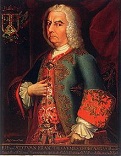





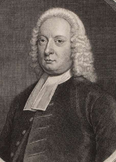



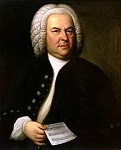
1746 On Jan. 17 the south-moving Scottish Highlander Jacobites under Bonnie Prince Charlie defeat the British at the Second Battle of Falkirk (first in 1298), becoming the last major Jacobite V; Earl Loudon, gov. of Stirling Castle loses most of his army and flees the "rout of Moy" to the safety of Skye, where he sits out the rest of the rebellion. In Feb. the French capture Brussels and Antwerp, followed by Mons and Namur. Time for the wappenshawing from hell? The last pitched battle on British soil, and it had to be with the *!?!* Scots? The Scottish Gettsburg? On Apr. 16 the Scottish Jacobite army of 7K Highlanders, led by "Young Pretender" Charles Edward Stuart (Bonnie Prince Charlie) is defeated by 8K British redcoat regulars led by the Duke of Cumberland at the 1-hour Battle of Culloden Moor on Drummossie Muir 6 mi. E of Inverness (not far from Loch Ness and Urquhart Castle), causing chicken Prince Charlie to flee to France with the help of Flora MacDonald (1722-90), becoming the last Stuart effort to reclaim the throne and the end of two cents. of Roman Catholic-Protestant war in England; he abandons 4K troops trying to regroup at Ruthven, telling them to fend for themselves, pissing them off at the yellow "Italian" (raised in Italy); Augustus is made capt.-gen. of the British army; to cement the Union of 1706 the British make a concerted attempt to destroy Scottish culture and language, eradicating the clan system and banning Highland dress (kilt and tartans) and the playing of the bagpipes (supposedly instruments of war) (until 1782), causing many Scots to emigrate, leaving the Highlands beautiful and empty of people; the last executions until WWI take place for POWs of the rebellion in the Tower of London; Highlanders are forced off their ancestral lands, and the culture goes underground, with many Scots scattered around the world (where many become famous inventors and engineers like Scotty on Star Trek?) - rather have a Hawaiian shirt? In June Russia and Austria form an alliance against Prussia. On July 9 Spanish king (since Nov. 1, 1700) Philip V (b. 1683) dies, leaving Spain stripped of its European possessions incl. Gibraltar and Minorca, and is succeeded by his 4th son (by Mari Luisa of Savoy) Ferdinand VI (the Learned) (1713-59), who becomes Spanish Bourbon king #3 (until Aug. 10, 1759), going on to patronize castrato Farinelli, end the influence of widow (of Philip V) Queen Elisabeth Farnese of Parma and her Italian courtiers, who retires fro the court, and pursue a policy of neutrality between France and Britain without renouncing its claim to Gibraltar; he builds up the royals-and-nobles-only city of Aranjuez 26 mi. S of Madrid (modern-day pop. 58K) on the site of the ancient town of Ara Jovis (Lat. "altar of Jove") and a royal summer palace built by HRE Philip II (1527-98), allowing non-royals to stay overnight in 1752; his treasury secy. the Marquis of Ensenada modernizes Spain, creating the Giro Real bank in 1752, registering ships to trade freely in the Americas, modernizing the navy, founding the Royal Academy of the Fine Arts of San Fernando in 1752, which patronizes composer Domenico Scarlatti, and improving relations with the Church. On Aug. 6 Christian VI (b. 1699) of Denmark dies, and is succeeded by his son Frederick V (1723-66) (until Jan. 14, 1766), revolting against his Pietist upbringing and becoming a wine-women-song hedonist, becoming an alcoholic whot leaves ruling to his ministers, who keep Denmark out of the Euro wars. On Aug. 19-20 Ft. Massachusetts at the W border of the Province of Mass. Bay is attacked and destroyed by the French allied with Indians. On Oct. 11 120K French troops under Gen. Maurice de Saxe defeat 80K-97K Austrians at the Battle of Roucoux, with 4K-5K Austrians KIA and 3K taken POW, vs. 3.5K French losses. On Oct. 22 the Presbyterian College of New Jersey (Princeton U. in 1896) in Elizabeth, N.J., founded by the New Light Presbyterians receives its charter as the successor to William Tennent's Log Cabin for the training of ministers, moving next year to Newark, N.J., and in 1756 to Princeton, N.J.; James Madison and Aaron Burr later attend, and are in the debating club (America's oldest) together. The First Carnatic War (ends 1748) between France and Britain over control of S India begins; the French oust the British from Madras and Machilipatnam (Bandar). Giovan Battista "Balilla" Perasso throws a stone at an Austrian official in Genoa, launching a revolt against the Hapsburgs. Rama Varma dies, and Veera Kerala Varma (d. 1749) becomes king of Cochin in S India. Henry Pelham's cabinet gets in a pissing war with George II over their desire to admit William Pitt, whom the king dislikes for his Hanoverian subordination comments; after the king forces the cabinet to resign, and gives the seal to Lord Bath (Pulteney), the latter can't find a majority, and gives the cabinet back with the compromise that Pitt will be relegated to the ministry instead as paymaster-gen. for the British forces; Lord Pelham becomes secy. of state. A royal edict is issued in Sweden against drinking coffee and tea due to "the misuse and excesses of tea and coffee drinking", with a heavy consumption tax and fines and confiscation of cups and dishes for failing to pay it, after which in ? consumption is completely banned, which only makes it more popular?, causing Gustav III to order the Swedish Coffee Experiment, forcing two identical twins condemned to death to drink three pots of one or the other for life to avoid execution, only to find it doesn't shorten their lifespans, which doesn't stop the govt. from renewing the ban in 1794, and again several times until the 1820s, after which Sweden becomes one of the most coffee-loving counries on Earth (until ?). Nockamixon ("at the place of three huts or soft soil") in Penn. is founded near the Delaware River. Italian painter Antonio Canaletto comes to England (until 1755). Charles de Lorraine (-1780) succeeds Charles Radclyffe as grandmaster of the Priory of Sion (until 1780) :). Poor Richard's Almanack for 1746. Architecture: New Palace in Stuttgart, Germany is begun (finished 1807). Science: Benjamin Franklin spends the summer experimenting with electricity. De Cheseaux's Comet is first observed on Aug. 13 by Philippe Loys de Cheseaux (1718-51). Jean-Etienne (Jean-Étienne) Guettard (1715-86) pub. the first geological map of France. German chemist Andreas Sigismund Marggraf (1709-82) isolates zinc by heating calamine and carbon, and pub. the discovery and gets credit although he isn't the first. 20,548 ft. (6,263m) Mount Chimborazo on the equatorial bulge in the Cordillera Occidental range of the Andes in Ecuador (whose summit is the point on the Earth's surface farthest from the Earth's center) is climbed by French academicians of the French Geodesic Mission to determine whether the Earth is spherical or oblate along with another team in Lapland, but they do not reach the summit; in 1802 an expedition led by Baron Alexander von Humboldt (1769-1859) reaches 5,875m, a record for Euros, giving up after suffering from altitude sickness; in 1831 Jean-Baptiste Joseph Dieudonne Boussingault (1801-87) reaches a new record of 6,006m; on Jan. 4, 1800 an expedition led by English mountaineer Edward Whymper (1840-1911) reaches the summit, becoming the first Euros to summit a mountain higher than 20K ft.; after some critics express doubt, he does it again later in the year. Nonfiction: Etienne Bonnot de Condillac (1715-80), Essai sur l'Origine des Connaissances Humaines (Essay on the Origin of Human Knowledge). Capt. Edward Danvers, A Voyage to Padanaram (3 vols.); East India ship Bonaventure; vol. 3 is about "the manners and customs of the Mahometans". Denis Diderot (1713-84), Philosophical Thoughts (Pensées philosophiques) (first work); argues for a reconciliation of reason with feeling, attempting to prove the existence of the Deist God from the organization of seeds, insects, etc.; "The Christian God is a father who prizes his apples but sets little value on his children"; "We are constantly railing against the passions; to them we ascribe all of man's afflictions while forgetting that they are the source of all pleasures...But what provokes me is that only their adverse side is considered... And yet only passions and great passions can raise the soul to great things. Without them the sublime no longer exists either in morals or in creativity"; "People begin to speak to us of God too soon, and another mistake is that his presence is not sufficiently insisted upon. Men have banished God from their company and have hidden him in a sanctuary; the walls of a temple shut him in, he has no existence beyond. Fools that you are, break down these limitations that hamper your ideas; set God free; see him everywhere, as he is everywhere, or say that he is non-existent. If I had a child to bring up, I would make his God his companion in such a real sense that he would perhaps find it less difficult to become an atheist, than to escape his presence. Instead of confronting him with a fellow-man (whom maybe he knows to be worse than himself) I would say outright: 'God hears you and you are lying.' Young people are influenced by their senses. I would multiply about him symbols indicating the divine presence. If there were a gathering at my house, I would leave a place for God, and I would accustom him to say: 'We were four - God, my friend, my tutor, and myself'"; in July the Paris Parlement orders it to be publicly burned, but can't obtain a copy, burning some random papers, making it more popular Jonathan Edwards (1703-58), A Treatise Concerning Religious Affections. John Gill (1697-1771), An Exposition of the New Testament (3 vols.) (1746-8); followed by "Exposition of the Old Testament" (6 vols.) (1748-63); his magnum opus, earning him an honorary doctor of divinity degree from the U. of Aberdeen in 1748, making him the first major Baptist theologian. David Hartley (1705-57), Conjecturae Quaedam de Motu, Sensus et Idearum Generatione - you gotta keep 'em separated? Samuel Johnson (1696-1772), A System of Morality; reprinted by Ben Franklin in 1752 as "Elementa Philosophica". Thomas Prince, The Salvations of God in 1746 (Boston). Music: Henry Carey (1692-1743), God Save the King; becomes the British nat. anthem after it is played in London in sympathy for George II, with a new anti-Scottish verse added after news of the Jacobite V at Prestopans. Art: Francois Boucher (1703-70), The Milliner; Madame Bergeret; Landscape with a Pond. Jean-Baptiste-Simeon Chardin (1699-1779), Amusements of Private Life. Etienne Maurice Falconet (1716-91), The Allegory of Sculpture (statue). Elias Gottlob Haussmann (1695-1774), Portrait of Johann Sebastian Bach. Joshua Reynolds (1723-92), The Eliot Family. Novels: Claude Prosper Jolyot de Crebillon (1707-77), La Nuit et le Moment. Christian Gellert (1715-69), Fabeln und Erzahlungen. Births: Swiss educator Johann Heinrich Pestalozzi (d. 1827) on Jan. 12 in Zurich; educated at the U. of Zurich. Swedish king (1771-92) Gustav (Gustavus) (Gustaf) III (d. 1792) on Jan. 24 (Jan. 13 Old Style); eldest son of Adolf Fredrik (1710-71) and Louisa Ulrika (1720-82) (sister of Frederick II the Great); brother of Charles XIII (1748-1818). French "Mademoiselle de Clermont" writer-educator Stephanie Felicite Ducrest de St.-Aubin, Comtesse de Genlis (AKA Madame Brulart) (d. 1830) on Jan. 25 in Champcery (near Autun); teacher of Louis-Philippe. Polish patriot, Am. Rev. gen. and hero Thaddeus (Tadeusz Andrzej Bonawentura) Kosciuszko (d. 1817) on Feb. 4 (Feb. 12?) in Mereczowszdzyzna (modern-day Merechevschina, Belarus). Am. Rev. War. gen. and statesman (DOI signer) Charles Cotesworth "C.C." Pinckney (d. 1825) on Feb. 25 in Charleston, S.C.; son of Charles Pinckney (-1758) and Eliza Lucas Pinckney (1722-93); brother of Thomas Pinckney (1750-1820); 2nd cousin of Charles Pinckney (1757-1824); educated at Oxford U. Corsican atty.-politician Nobile Carlo Maria (di) Buonaparte (d. 1785) on Mar. 27/29 in Ajaccio; son of Giuseppe Buonaparte (1713-63); father of Napoleon Bonaparte (1769-1821). Spanish artist Francisco Jose de Goya y Lucientes (d. 1828) on Mar. 30 in Fuendetodos (near Saragossa), Aragon; mother is of minor nobility, and father is a painter and gilder of altarpieces; apprentices from age 14-17 to Jose Luzan. French mathematician ("Father of Differential Geometry") (inventor of descriptive geometry) Gaspard Monge, Comte de Peluse (d. 1818) on May 9 in Beaune; created comte de Peluse in 1806. Am. composer Johann Friedrich Peter (d. 1813) on May 19 in Heerendijk, Netherlands; emigrates to the U.S. in 1770. English composer James Hook (d. 1827) on June 3 in Norwich. German educational reformer Joachim Heinrich Campe (d. 1818) on June 29 in Deensen. Irish statesman Henry Grattan (d. 1820) on July 3; educated at Trinity College, Dublin. Spanish gov. #5 of La. (1777-85) and Cuba Bernardo de Galvez (Gálvez) y Madrid, Viscount of Galveston and Count of Galvez (Gálvez) (d. 1786) on July 23 in Macharaviaya, Malaga; son of Matias de Galvez y Gallardo (1725-84); namesake of Galveston, Tex. Am. Rev War. politician (DOI signer) Thomas Heyward Jr. (d. 1809) on July 28 in St. Luke's Parish, S.C.; ancestor of DuBose Heyward (1885-1940); great-uncle of James Heyward Trapier. English Neoclassical architect James Wyatt (d. 1813) on Aug. 3; rival of Robert Adam (1728-92); brother of Samuel Wyatt (1737-1807); father of Benjamin Dean Wyatt (1775-1852), Philip Wyatt, and Matthew Cotes Wyatt (1777-1862). Dutch writer Hieronymus van Alphen (d. 1803)on Aug. 8 in Gouda. English (Welsh) hyperpolyglot (41 languages?) Orientalist-philologist Sir William Jones (d. 1794) on Sept. 28 in Westminster, London; educated at Univ. College, Oxford U.; knighted in 1783; founder of the Royal Asiatic Society; discoverer of the common roots of Indo-European languages in Sanskrit. Am. hymnodist (first Am. choral composer) William Billings (d. 1800) on Oct. 7 in Boston, Mass. Georgian king of Kartli and Kakheti (last) (1798-1800) George (Georgi) XII (d. 1800) on Nov. 10; son of Erekle II (1720-98) and 2nd wife Anna Abashidze. French Charles' Law inventor-mathematician-scientist-balloonist Jacques Alexandre Cesar (César) Charles (d. 1823) on Nov. 12 in Beaugency, Orleanais. Am. statesman (Freemason) ("the Chancellor") (co-drafter of the DOI) (chancellor #1 of New York State, 1777-1801) (U.S. foreign affair secy. #1, 1781-3) (U.S. minister to France, 1801-4) Robert Robert Livingston (d. 1813) on Nov. 27 in New York City; eldest son of Judge Robert Livingston (1718-75) and Margaret Beekman; one of 10 children; lives at Clermont Manor on the Hudson River; educated at King's College (Columbia U.); helps negotiate the Louisiana Purchase; known for quarreling with relatives. French Neoclassical painter Francois-Andre (François-André) Vincent (d. 1816) on Dec. 30; son of Francois-Elie Vincent (1708-90); student of Joseph-Marie Vien (1716-1809); rival of Jacques-Louis David. English writer Mary Anne Radcliffe (d. 1810). Deaths: British architect John James (b. 1673) on May 15 in Greenwich, London. Scottish-born Am. religious leader William Tennent (b. 1673) on May 6 in Warminster, Penn. French artist Guillaume Coustou the Elder (b. 1677). French Jesuit missionary Joseph-Francois Lafitau (b. 1681) in Bordeaux. Spanish Bourbon king #1 (1700-46) Philip V (b. 1683) on July 9 in Madrid. Italian architect Giacomo Leoni (b. 1686) on June 8 in London, England; dies after making Palladian architecture the std. in England; leaves unfinished "Treatise of Architecture and ye Art of Building Publick and Private Edifices - Containing Several Noblemen's Houses & Country Seats". Scottish philosopher Francis Hutcheson (b. 1694) on Aug. 8. German-born Am. newspaper publisher John Peter Zenger (b. 1697). Scottish mathematician Colin Maclaurin (b. 1698) on June 14. Scottish poet Robert Blair (d. 1699) on Feb. 4. Danish-Norwegian king (1730-46) Christian VI (b. 1699) on Aug. 6.

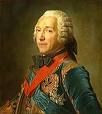













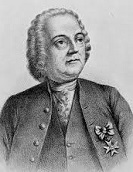


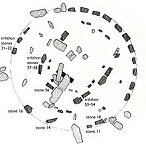
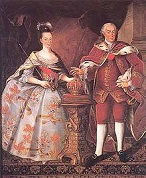
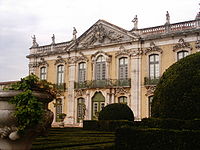
1747 There are measles epidemics in Conn., N.Y., Penn., and S.C. In Jan. Louis XV appoints Maurice, Comte de Saxe (1696-1750) as marshal-gen. of France; on July 2 the Battle of Lauffeld in Holland W of Maastricht is a V for France over Britain and its allies; ailing hero Marshal de Saxe retires and becomes the great-grandfather of novelist George Sand. In Jan. the French Army of the Piedmont under Charles Louis Auguste Foquet, Duke de Belle-Isle (1684-1761) drives the Austrians back from Provence into Italy; on July 19 the Piedmontese defeat the French at the Battle of Assietta near Colle dell'Assietta in Savoy, with 5K French vs. only 77 Sardinian casualties. On May 4 after the French army enters Flanders in Apr. to quell internal strife, the Netherlands States Gen. appoints Prince William IV of Orange-Nassau (1711-51) as the first hereditary stadholder of the seven provinces of the Netherlands (until Oct. 22, 1751), who moves from Leeuwarden to The Hague and appoints Duke Louis Ernest of Brunswick-Luneburg (1718-88) as field marshal of the Dutch army on Nov. 13, 1750. On May 14 14 British ships under adm. Sir George Anson defeat a 30-ship French convoy under adm. Jacques-Pierre de Taffanel de la Jonquiere (Jonquière) (1685-1752) (gov. of New France since last Mar. 1) in the First Battle of Cape Finisterre in the Bay of Biscay, then defeat a 6-ship French convoy under adm. Desherbiers de l'Entenduere (l'Etenduère) on Oct. 25 in the Second Battle of Cape Finisterre, ending French attempts to fight the British blockade, for which Anson is made a baron. When a king is a musician, the good jobs go to composers with training, or, Battle of the Giants? In May #1 classical music brain man Johann Sebastian Bach (1685-1750) ("Old Bach") makes a surprise visit to Potsdam to see his son Carl Philipp Emanuel Bach, who is the capellmeister (choirmaster) at Frederick II the Great's court; the king summons him to court despite having just arrived from a 2-day coach ride, gives him a tour of his 15 Silbermann pianos, and then tries to trap him by inviting him to play each one of them, and compose a 3-part fugue in his head based on a theme he provides and then play it; Old Bach does it, so Freddy (confusing Bach in his mind with his mean father?) ups the demand to a 6-part fugue on the same theme, which Bach declines for the moment; the next day Bach plays every organ in Potsdam; after returning to Leipzig, on July 7 he composes The Musical Offering (Das Musikalisches Opfer), which incl. one 3-part fugue, one 6-part ricercar (fugue), 10 canons, and a trio sonata, and dedicates it to Freddy with the inscription "Regis Iusu Cantio Et Reliqua Canonica Arte Resoluta" (At the King's Command, the Song and the Remainder Resolved with Canonic Art) (RICERCAR); the Italian word ricercare means "to seek". On June 9 emperor (since 1735) Sakuramachi (b. 1720) abdicates in favor of his 6-y.-o. son Momozono (Toohito) (1741-62), who becomes Japanese Yamato emperor #116 (until Aug. 31, 1762). On June 20 cruel shah (since Mar. 8, 1736) Nadir (Nader) Shah (b. 1688) is assassinated with popular approval by his own military bodyguard in a palace revolt, and in Oct. Hanafi Sunni Muslim ethnic Pashtun (Sadozay clan of the Abdali tribe) (who claim descent from the lost Israeli tribe of Joseph) Ahmad (Ahmed) Shah Durrani (1724-73), the bodyguard cmdr. proclaims himself king (shah) of Afghanistan in Kandahar, adopting the title Duran Duran, er, Durr-i Duran (Pearl of Pearls), founding the Durrani Dynasty in Afghanistan and E Persia, led by his Sadozay clan (until 1826), going on to puncture, er, jab, er, invade the Punjab 6x in 1748-52, and 2x more in 1753-67; meanwhile the rival Barakzay clan waits in the wings in Afghanistan, and Nadir's Afshar dynasty holds on in Mashhad and Khurasan province under Ebrahim Afshar (-1748), nephew of Nadir Shah, who on July 6 becomes king (until Sept. 1748); meanwhile his brother Adil Shah (Pers. "righteous king") kills all other heirs to the throne and proclaims himself shah, but isoverthrown and killed by his own troops next Sept. 24; meanwhile Karim Khan Zand (1705-79) of the Persian Zand tribe (a former soldier in Nadir Shah's army) controls W Persia, with capital at Shiraz, taking the title of wakil (deputy) instead of shah and reversing Nadir Shah's anti-Shiite policy, establishing a dynasty that lasts until 1794; meanwhile Mamluk officers of Georgian origin obtain autonomy of Iraq from the Turkish sultan (until 1831), going on to suppress tribal revolts and bring peace on the Iran-Iraq frontier, curb the Janissaries, and modernize the economy and military. On Oct. 24 the Ohio Co. of Virginia is formed. Sweden and Prussia form an alliance for mutual defense. Ang Tong becomes king of Cambodia (until 1749). England institutes a carriage tax. Frederick II the Great orders the Oder Valley drained (finished 1753), and arranges for 300K new immigrants to Prussia, along with the growing of potatoes (used for hog feed in the rest of Europe) and improved conditions for serfs on royal lands; he also issues an edict prohibiting the baking of chocolate. Robert Harper sets up a ferry at the junction of the Potomac and Shenandoah Rivers, which grows into the town of Harpers Ferry, W. Va. - no apostrophes, please? The United Society of Believers in Christ's Second Appearing (Shakers), led by James Wardley secede from the less shaking Quakers in Manchester, England, going on to build 19 communities and gain 200K converts over the next cent., concentrated in New England, N.Y., Ohio, and Ky., although never more than 6K at a time since they require strict sexual abstinence, and getting preggers would be a turnoff, although adoption of orphans is okay; they become known for their simplistic Shaker furniture; by 2000 they are down to six living at Sabbathday Lake near Auburn, Maine. English brain man William Whiston (1667-1752) walks out of an Anglican church as they are reading the Athanasian Creed, and joins the Baptists. The Burger Wars, er, Burgher-Antiburgher War starts when the Synod of the Secession Church of Scotland splits over the words "the true religion presently professed" in the oath of office for burghers; the antiburghers hold that the phrase refers to the corrupt Established Church of Scotland, and the burghers hold that it only means the Protestant religion - will you have an elf drop by and demonstrate? David Garrick becomes co-owner and co-mgr. of Drury Lane Theatre, enforcing his own acting style on all the actors and creating an ensemble, ending the custom of letting the privileged sit on the stage, and producing 24 Shakespeare plays - I was completely in tears until I clicked? Poor Richard's Almanack for 1747. Benjamin Franklin writes The Speech of Polly Baker, a long article for a British newspaper about Polly Baker, an unwed New Englander prosecuted for giving birth to a 5th illegitimate child, but whose impassioned plea causes the judges to acquit her and one of them to marry her the next day; three decades later Franklin finally admits that the article is a hoax - pull my finger and I'll tell you? Architecture: After marrying Queen Maria I, thePalace of Queluz in Qeluz, Sintra (near Lisbon), Portugal is begun by Portuguese architect Mateus Vicente de Oliveira (1706-86) as a summer retreat for Dom Pedro (Peter III) of Braganza as an attempt to rival the Escorial Place in Spain, becoming one of the last great Rococo bldgs. in Europe, known as the Portuguese Versailles; after Dom Pedro's death in 1786, his consort Queen Maria I goes mad, and she is confined in the Pavilion (Pousada) of Dona Maria (finished 1792), designed by architect Miguel Caetano de Sousa (1738-1802), even holding the Cortes there. The Italian Nat. Library (Biblioteca Nazionale) in Florence, Italy is founded. The Polish Nat. Library in Warsaw is founded by brothers Jozef Andrzej Zaluski and Andrzej Stanislaw Zaluski. Science: On Apr. 8 French opthalmologist Jacques Daviel (1696-1762) performs the first extracapsular cataract extraction surgery, becoming the first significant advance since couching in ancient India - just use a laser? Benjamin Franklin's Library Co. receives a long glass Collinson tube for generating static electricity, and Franklin begins experimenting with it, having more tubes made for his use; he first uses the terms positive (plus) and negative (minus) to describe electrical charges, asserting that electricity is not two types of fluid but one. Swedish-Finnish botanist Pehr (Pietari) Kalm (1716-79) begins a 3-year plant-collecting tour of North Am. under sponsorship of the Swedish Academy of Sciences. Edinburgh physician James Lind (1716-94) discovers that lemons and oranges cure Scurvy, while vinegar, garlic, and seawater are ineffective; British ships begin carrying limes from Montserrat Island in the Caribbean, causing British seamen to become known as limeys. German chemist Andreas Sigismund Marggraf (1709-82) discovers sugar in beet roots, also a pure form of zinc; his student Franz Karl Achard (1753-1821) goes on to devise an economical industrial method to extract pure sugar from beets. French scientists Pierre de Maupertuis (1698-1759) (whose portrait bears a striking resemblance to actor Bob Hope (1903-2004)?) and Alexis Claude Clairaut (1713-65) return from expeditions to Peru and Lapland with proof that the Earth is oblate as predicted by Newton, not ovoid as predicted by Descartes - he laid an egg? Nonfiction: Olof von Dalin, Svea Rikes Historia (History of Sweden) (3 vols.) (1747-62). Denis Diderot (1713-84),The Skeptic's Walk (La Promenade du sceptique); a dialogue between a deist, atheist, and pantheist on the nature of God, which pisses-off the local authorities, who seize the ms., causing pub. to be delayed until 1830. Benjamin Franklin (1706-90), Plain Truth; Biographia Britannica (1747-66). Dr. Samuel Johnson (1709-84), Plan of a Dictionary of the English Language; how he reached an agreement with pub. firm in 1746, and tells them it will take three years, but it ends up taking eight, working out of his lodgings at 17 Gough Square with his amanuenses (finished 1755). Julien Offray (Offroy) de la Mettrie (1709-51), Man A Machine (L'homme machine); written at the court of Frederick II the Great; argues that thought is a property of organized matter, and reduces philosophy to a fight between spiritualists (boo) and materialists (hooray): "The brain has muscles for thinking as the legs have muscles for walking" - what about that third leg? Abbe Prevost (1697-1763), Travels (20 vols.); pub. by Francois Didot. John Rocque, Plan of the Cities of London and Westminster. Thomas Simpson (1710-61), Elements of Geometry. William Stith (1707-55), The History of the First Discovery and Settlement of Virginia. Gilbert West, Observations on the Resurrection. John Wood the Elder (1704-54), Choir Gaure, Vulgarly Called Stonehenge, on Salisbury Plain; the most important detailed plan yet made, allowing modern computer models, pissing-off antiquarian William Stukeley by claiming that the Druids were pagan not Biblical patriarchs. Music: J.S. Bach (1685-1750), The Musical Offering (Das Musikalisches Opfer) (July 7). G.F. Handel (1685-1759), Judas Maccabaeus (oratorio) (Covent Garden, London). Jean-Philippe Rameau (1683-1764), Les Fetes de l'Hymen et de l'Amour (opera) (Versailles) (Mar. 15); first of several librettos by Freemason Louis de Cahusac (1706-59); composed for the dauphin's marriage to Maria Josepha of Saxony. Jean-Jacques Rousseau (1712-78), Les Muses Galantes (opera). Art: Francois Boucher (1703-70), Shepherd Piping to a Shepherdess (1747-50). Plays: Charles Colle, La Verite Dans le Vin (comedy of manners). David Garrick (1717-79), Miss in her Teens, or The Medley of Lovers (comedy). Christian Gellert (1715-69), Die Kranke Frau (comedy). Poetry: William Collins (1721-59), Ode to Evening; "Then lead, calm votaress, where some sheety lake/ Cheers the lone heath, or some time-hallowed pile,/ Or upland fallows grey/ Reflect its last cool gleam"; a landmark in the transition from classicism to Romantic goop? Friedrich Gottlieb Klopstock (1724-1803), An Meine Freunde; repub. in 1767 as "Wingolf". Novels: Samuel Richardson (1689-1761), Clarissa; Or, The History of a Young Lady. Voltaire (1694-1778), Zadig; or, The Book of Fire; based on "The Three Princes of Serendip". Births: French #1 watchmaker Abraham Louis Breguet (d. 1823) on Jan. 10 in Neuchatel, Switzerland. German Titus-Bode Law astronomer Johann Elert Bode (d. 1826) on Jan. 19 in Hamburg; has a bad right eye; names the planet Uranus. British vice-adm. Sir John Thomas Duckworth, 1st Baronet (d. 1817) on Feb. 9 in Leatherhead, Surrey; created baronet in 1813. French rev. leader Louise Philippe Joseph, Duc d'Orleans (AKA Philippe Egalite) (Philippe Égalité) (d. 1793) on Apr. 13 in Chateau de Saint Cloud, Saint-Cloud; son of Louis Philippe I (1725-85) and Louise Henriette de Bourbon-Conti (1726-59); father of Louise Philippe (1773-1850). French gen. Armand Louis de Gontaut Lauzun, Duc de Biron (d. 1793) on Apr. 15 in Paris; great-grandnephew of Charles de Gontaut (1562-1602). Austrian next-to-last HRE (1790-2) and grand duke of Tuscany (1761-90) Leopold II (Peter Leopold Josef Anton Joachim Pius Gotthard) (d. 1792) on May 5 in Vienna; son of Francis I; brother of HRE Joseph II; father of grand duke Ferdinand III (1769-1824); educated for the priesthood, turning him off to the Church. Am. Rev. War naval officer ("I have not yet begun to fight") John Paul Jones (d. 1792) on July 6 in Kirkcudbright, Scotland; birth name is John Paul; adds the surname Jones after he becomes a fugitive from British justice in 1773; sails as a cabin boy to Fredericksburg, Va. at age 12 to live with his brother William. German anti-Kantian historian-philosopher Christoph Meiners (d. 1810) on July 31 in Warstade (near Ottendorf); educated at the U. of Gottingen. Am. Tenn. politician William Cocke (d. 1828) on Sept. 6 in Amelia County, Va.; father of John Alexander Cocke (1772-1854); grandfather William Michael Cocke (1815-96). South African explorer Petrus Johannes (Jan Pieter) Truter (d. 1825) on Dec. 17 in Cape Town. Am. pioneer (founder of Wheeling, W. Va.) Ebenezer Zane (d. 1811) in Moorefield, Va. (modern-day W. Va.); maternal great-grandfather of Zane Grey (1872-1939). Francis Salvador (d. 1776) in London; grandson of Joseph Salvador, first Jewish dir. of the East India Co., who arranged for the 7-man delegation to congratulate George III on his accession; emigrates to the U.S. in 1773; first Jew to be elected to an Am. colonial legislature, to serve in the Continental Congress, and to die for the cause of Am. liberty. Am. surveyor-historian John Filson (d. 1788) in Chester County, Penn. New England horse breeder Justin Morgan (d. 1798). Am. Rev. War. soldier (black) Salem Poor (d. 1802) in Andover, Mass.; buys his freedom in 1769. Hungarian dramatist-poet Gyorgy Bessenyei (d. 1811) in Berczel, Szabolcs; of noble birth. Am. printer John Dunlap (d. 1812) in Strabane, County Tyrone, Northern Ireland; emigrates to the U.S. in 1757. Russian Alaskan explorer-trader Alexander Andreyevich Baranov (d. 1819) in Kargopol, St. Petersburg. Am. Rev. War. brig. gen. (founder of Knoxville, Tenn.) James White (d. 1821) in Rowan County, N.C. Deaths: Italian antiquarian Francesco Ficoroni (b. 1664) in Rome. Italian painter Giuseppe Crespi (b. 1665) on July 16. French novelist-dramatist Alain-Rene Lesage (b. 1668). Scottish field marshal John Dalrymple, 2nd earl of Stair (b. 1673) on May 9 in Edinburgh. German field marshal Leopold I of Anhalt-Dessau (Der Alte Dessauer) (b. 1676) on Apr. 7 in Dessau. English academic Joseph Trapp (b. 1679) on Nov. 22 in Harlington (pleurisy). Persian king Nadir Shah Afshar (b. 1688) on June 19 (assassinated).
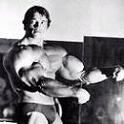


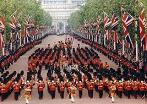


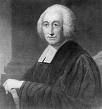




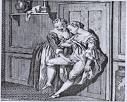




1748 On July 18 the Battle of Beukendaal (Beechdale) near Schenectady, N.Y. sees the Dutch farmer militia put up a fight against French and Indians. On Oct. 18 after Russian troops march through Bohemia toward the Rhine River, the War of the the Austrian Succession (King George's War) (War of Jenkins' Ear) (begun 1740) is ended by the Treaty of Aix-la-Chapelle (Aachen), a gen. recognition of the Pragmatic Sanction and of HRE Francis I; France returns the Austrian Netherlands and the British colonies; Louisbourg is returned by Britain to the French, which enrages New Englanders, but in return they give Madras back to the British, ending the First Carnatic War (begun 1746); the British privilege of transporting slaves to Spanish Am. is renewed, but the problem of Spanish searching of British ships is avoided; Frederick II of Prussia retains Silesia, sewing the seeds for another European war later; Parma is given to Charles II's younger brother Philip (Felipe) of Spain (1720-65); Savoy receives parts of Milan; Italy now enjoys a half-cent. of peace, during which the Kingdom of the Two Sicilies prospers. On Nov. 10 the Trooping the Colour Ceremony at the Horse Guards Parade in Whitehall Palace next to St. James's Park is first performed to mark British king George II's official birthday; it is later held on the 2nd Sat. in June. Nadir Shah's grandson Shah Rukh (Shahrokh Shah Afshar) (1730-96) becomes ruler of Persia (until 1796). John Montagu, 4th Earl of Sandwich (1718-92), known for eating sandwiches while playing cribbage is appointed first lord of the admiralty, and begins rebuilding the English navy. Bonnie Prince Charlie (b. 1788) is expelled from France, and roams around Europe, becoming a broken drunkard with an infected johnson - hoping to marry some money? Lord Chesterfield (d. 1773) retires from politics, and spends the rest of his life in ease. Madame Marie Therese Rodet Geoffrin (1699-1777) sets up a salon in Paris for Encyclopedists and artists, later attracting David Hume and Horace Walpole. Hereditary jurisdiction is abolished in suffering Scotland. Fur traders from Penn. and Va. begin establishing contacts with the natives in the Ohio River Valley; George II grants 500K acres in W Va. to the Ohio Land Co.; self-made man Benjamin Franklin (1706-90) retires from the printing business to concentrate on scientific experiments, buys a farm in the garden colony of N.J., changes his mind, and organizes a military assoc. for the defense of Penn. John Findlay discovers a passage through the Blue Ridge Mts. of the Appalachians, which he names the Cumberland Gap. The Shawnees and Iroquois hold a grand council which appoints Seneca chief Tanaghrisson (Tanacharison) (1700-54) as "half-king" over the Ohio Indians, and gives Oneida chief Scarouady ("on the other side of the sky") supervision over the Shawnees as the other "half-king". The British Board of Trade comes under the leadership of an aggressive new pres. who renders it more active and authoritative (ends 1761). The British navy and army settle relative ranks by dividing navy capts. into three grades, with those not eligible for promotion to rear adm. called "masters and commanders", and the letter C placed after their names; the rank is shortened to commander in 1794, with the abbrev. cdr. used in 1826. 16-y.-o. George Washington meets his distant relative, Scottish peer Thomas Fairfax, 6th Lord Fairfax of Cameron (1693-1781), who administers the 1649 land grand known as the Northern Neck Proprietary, and hires him to survey his lands W of the Blue Ridge Mts.; next July 24 he surveys and plats the town of Washington, Va. (AKA Little Washington) 70 mi. W of modern-day Washington, D.C. (modern-day pop. 135), which is officially established as a town by the Va. gen. assembly on Dec. 14, 1795 after it reaches a pop. of 200, becoming the first U.S. town named after the Father of Our Country. Christian brothers Johann Philipp Bethmann (1715-93) and Simon Moritz Bethmann (1721-82) found the Bethmann Banking Family in Frankfort, N Germany (ends 1976), which becomes a rival to the Jewish House of Rothschild, and also becomes known for philanthropy towards Jews, causing a rumor that they are secret Jews? Henry Melchior Muhlenberg (1711-87) of Germany, who arrived in Charleston, S.C. on Sept. 23, 1742 and settled in Philadelphia organizes Am. Dutch, Swedish, and German Lutherans into the Pennsylvania Ministerium, becoming the first Lutheran church synod in North Am. Count von Zinzendorf is permitted to return to Herrnhut for life (until 1760). Parson Joseph Greene, master of Stratford-upon-Avon Grammar School in England organizes the first recorded performance of a play ("Othello"?) by William Shakespeare in his hometown to fund the restoration of his funerary monument, performed by the Warwickshire Co. of Comedians in Birmingham. The French parliament forbids cultivation of the potato in the belief that it causes leprosy. ? Alcubierre, engineer for the king of Naples sinks a shaft into ancient Pompeii's business quarter through 20 ft. of volcanic debris, unearthing a wall painting and a dead Pompeian with a fistful of gold on a cobbled street, causing him to begin an excavation. Henry Fielding becomes a justice of the peace for Westminster, mainly concerned with ruffianism, which furnishes material for his novels. Gotthold Ephraim Lessing (1729-81) graduates from the U. of Leipzig, then moves to Berlin, where he becomes lit. critic of the Vossische Zeitung (1751-5). Thomas Lowndes (1692-1748) leaves a bequest founding the Lowndean chair of astronomy at Cambridge. A subscription library opens in Charleston, S.C. The Holywell Music Room in Oxford, England opens. The Bow Porcelain Factory in England is founded (first English soft-paste porcelain factory?); in 1775 is is purchased by Derby. Poor Richard's Almanack for 1748. Sports: The English Court of the King's Bench rules that cricket is a "legal sport" not covered by the 1710 statute of Queen Anne (9.16). Inventions: Lewis Paul (-1759) of Birmingham, England invents the hand-driven wool carding maching. Science: After 18.5 years of measurements, English astronomer royal James Bradley announces that the Moon's pull affects the direction of the Earth's axis (nutation). English physician John Fothergill (1712-80) first describes diphtheria. French physicist Abbe Jean-Antoine Nollet (1700-70) invents the Electroscope, and describes how a cylinder filled with alcohol, closed with an animal bladder and immersed in water causes the bladder to swell to bursting as water passes in and alcohol can't pass out, becoming the first description of Osmotic Pressure (Gr. "osmos" = impulse). Nonfiction: Archibald Bower (1686-1766), History of the Popes (7 vols.) (1748-66). Leonhard Euler (1707-83), Analysis Infinitorum. Rev. William Gilpin (1724-1804), A Dialogue upon the Gardens... at Stow in Buckinghamshire. Johann Christoph Gottsched (1700-66), Grundlegung einer Deutschen Sprachkunst. Ludvig Holberg (1684-1754), Letters (5 vols.) (1748-54). David Hume (1711-76), Philosophical Essays (An Enquiry Concerning Human Understanding) (1748-53); a condensation of his 1739 "Treatise". Baron de Montesquieu (1689-1755), The Spirit of the Laws (De l'Espirit des Loix) (English trans. 1750); examines the republic, monarchic, and despotic forms of govt., and advocates the principle of the separation of powers of govt. ; claims that climate influences nat. character. Thomas Simpson (1710-61), Trigonometry, Plane and Spherical. John Peter Stehelin, The Traditions of the Jews, with the Expositions and Doctrines of the Rabbins; abriged English tr. of "ENtdecktes Judenthum" (1700) by Johann Andreas Eisenmenger (1654-1704). Antonio de Ulloa (1716-95), A Voyage to South America. Peter Whalley, An Inquiry Into the Learning of Shakespeare; With Remarks on Several Passages of His Plays in a Conversation Between Eugenius and Neander. Music: J.S. Bach (1685-1750), The Art of the Fugue (Die Kunst der Fuge) (BMV 1080) (1748-50); 12 fugues and two canons. Carlo Goldoni (1707-93), La Favola dei Tre Gobbi (opera bouffe). Jean-Philippe Rameau (1683-1764), Zais (Zaïs) (opera) (Paris Opera) (Feb. 29); libretto by Louis de Cahusac; incl. Zais Overture, which depicts the emergence of the four elements from chaos. Frantisek Xaver Richter (1709-89), La Deposizione della Croce (oratorio). Art: Francois Boucher (1703-70), The Bird Catchers; The Fountain of Love. Thomas Gainsborough (1727-88), Cornard Wood; Mr. and Mrs. Robert Andrews. William Hogarth (1697-1764), O the Roast Beef of Old England (The Gate of Calais) (satire). Plays: Prosper Jolyot de Crebillon (1674-1762), Catilina. Carlo Goldoni (1707-93), La Putta Onorata (The Honorable Maid) (comedy); La Buona Moglie (The Good Wife) (comedy). Carlo Gozzi (1720-1806), Turandot. Gotthold Lessing (1729-81), Der Junge Gelehrte (comedy); his first play, while a student at the U. of Leipzig. Poetry: William Collins (1721-59), Ode to Evening; Ode to Simplicity; Elegy to James Thomson. Friedrich Gottlieb Klopstock (1724-1803), Der Messias (The Messiah) (20 cantos) (1748-73); pub. anon.; inspired by John Milton's "Paradise Lost"; first 10 cantos are a big hit in Germany. Ambrose Philips (1674-1749), Collected Poetry (posth.). Novels: John Cleland (1709-89), Fanny Hill, Memoirs of a Woman of Pleasure (Nov. 1748/Feb. 1749); first work of pornography in English; writes it in Fleet Prison (debtor's priz); gets him arrested in Nov. 1749, at which time he disavows the novel, causing pirate eds. to flourish, incl. one with a male rump-ranging episode, fueling rumors of his homosexuality, esp. as he never marries. Samuel Richardson (1689-1761), Clarissa, or The History of a Young Lady. Tobias Smollett (1721-71), The Adventures of Roderick Random (picaresque). Births: German Romantic "Lenore", "Der Wilde Jager" lyric poet Gottfried August Burger (Bürger) (d. 1794) on Jan. 1 in Molmerswende (near Halberstadt). German Bavarian Order of the Illuminati founder Johann Adam Weishaupt (d. 1830) (d. 1811?) on Feb. 6 in Ingolstadt, Bavaria; educated at the U. of Ingolstadt. British jurist, economist and radical (pro-democracy) social philosopher (atheist) Jeremy Bentham (d. 1832) on Feb. 15 (Feb. 4 Old Style) in London; educated at Queen's College, Oxford U.; co-founder of Utilitarianism. Dutch prince of Nassau-Orange (1751-1806) (2nd and last hereditary Stadtholder of the Dutch Repub.) William V (d. 1806) on Mar. 8 in The Hague; only son of William IV (1711-51); father of King William I (1772-1843). Am. Quaker liberal minister Elias Hicks (d. 1830) on Mar. 10 in Rockaway, Long Island, N.Y. Scottish uniformitarian geologist John Playfair (d. 1819) on Mar. 10; disciple of James Hutton (1726-97). English engineer-inventor (inventor of the hydraulic press) (father of the machine tool industry?) Joseph Bramah (d. 1814) on Apr. 13 in Wentworth, Yorkshire. French "What is the Third Estate?" priest Comte (Abbe) Emmanuel Joseph Sieyes (Sieyès) (d. 1836) on May 3 in Frejus (Fréjus). Am. Rev. War gen. Peleg Wadsworth (d. 1829) on May 6 in Duxbury, Mass.; maternal grandfather of Henry Wadsworth Longfellow (1807-82); educated at Harvard U. French "Declaration of the Rights of Woman" feminist-abolitionist playwright-journalist Olympe de Gouges (Marie Gouze) (d. 1793) on May 7 in Montauban, Tarn-et-Garonne. English statesman-poet-dramatist Frederick Howard, 5th Earl of Carlisle (d. 1825) on May 28; son of Henry Howard, 4th earl of Carlisle (1694-1758). English "The History of Sandford and Merton" writer Thomas Day (d. 1789) on June 22 in Wellclose Square, London; educated at Corpus Christi, Oxford U.; pro-Rousseau and pro-Am. Rev. German naturalist Johann Friedrich Gmelin (d. 1804) on Aug. 8 in Tubingen; educated at the U. of Tubingen. French Jacobin painter (Freemason) ("Stage Manager of the French Revolution") ("the Robespierre of the Brush")Jacques-Louis David (d. 1825) on Aug. 30 in Paris; a fencing injury leaves him with a funny facial expression and a speech impediment and later a benign tumor, causing him to be known as "David of the Tumor"; has twin daughters, who both marry generals. British vice adm. Cuthbert Collingwood, 1st Baron Collingwood (d. 1810) on Sept. 26 in Newcastle upon Tyne, Northumberland. Swedish king (1809-18) and Norwegian king (1814-18) Charles (Carl) XIII (d. 1818) on Oct. 7; 2nd son of Adolf Frederick (1710-71) and Louisa Ulrika of Prussia (1720-82) (sister of Frederick II the Great); brother of Gustav III (1746-92). Am. Thomas Jefferson's wife (1772-82) Martha Wayles Skelton Jefferson (d. 1782) on Oct. 30 (Oct. 19 Old Style) in Charles City County, Va.; Lancaster, England-born father John Wayles (1715-73) and Va.-born mother, who brings personal slave Susanna plus 120+ other slaves as part of her dowry, who bears 11-y.-o. daughter Elizabeth "Betty" Hemings (1735-1807), mother with John Wayles of Mary Hemings (1753-1835) and Sally Hemings (1773-1835); mother of Martha Jefferson "Patsy" Randolph (1772-1836). Am. lawyer-jurist-writer Hugh Henry Brackenridge (d. 1816) in Kintyre (near Campbelltown), Scotland; emigrates to the U.S. in 1853; educated at Princeton U. Spanish Bourbon king #4 (1788-1808) Charles IV (d. 1819) on Nov. 11 in Portici; 2nd son of Charles III (1716-88) and Maria Amalia of Saxony. French chemist (atheist) Claude Louis Berthollet (d. 1822) on Dec. 9 in Talloires (near Annecy), Savoy; educated at the U. of Turin; not to be confused with French chemist Pierre Berthelot (1827-1907). Afghani Durrani shah #2 (1773-93) Timur Shah Durrani (d. 1793) in Mashhad; ethnic Pashtun; son of Ahmad Shah (1724-73). Montenegran prince-bishop (1784-1830) (St.) Peter I (d. 1830) in Njegusi. Deaths: Swiss mathematician Jean Bernoulli (b. 1667) on Jan. 1 in Basel. Scottish surgeon Charles Maitland (b. 1668) in Aberdeen. English bishop Edmund Gibson (b. 1669). Indian ruler of Hyderabad (1720-48) Nizam-ul-Mulk (b. 1671) on June 1 in Burhanpur. English actress Anne Bracegirdle (b. 1674). English "When I Survey the Wondrous Cross", "There Is a Land of Pure Delight" hymn writer Isaac Watts (b. 1674) on Nov. 25; wrote 700+ hymns and psalms. German composer-organist Johann Gottfried Walther (b. 1684) on Mar. 23. English painter-architect-gardener William Kent (b. 1685) on Apr. 12 in London. English academic William Holmes (b. 1689) on Apr. 4. German physicist Eward Georg von Kleist (b. 1700) on Dec. 11. Scottish poet-dramatist James Thomson (b. 1700) on Aug. 27 in Richmond upon Thames, England.


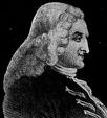
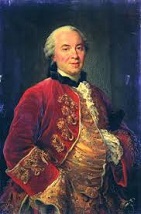

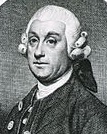







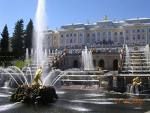

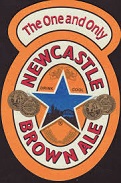
1749 On Jan. 3 N.H. gov. (1741-67) Benning Wentworth (1696-1770) begins issuing the New Hampshire Grants on lands in Vt. claimed by New York. On Jan. 11 the Ohio Co. petitions King George for a grant of lands, and proposes to build a fort there; the petition is granted on Mar. 16. In Jan. Veera Kerala Varma dies, and Rama Varma (d. 1760) becomes king of Cochin. In Apr. Benjamin Franklin surmises that lightning is a form of electricity, and warns that it is dangerous to take shelter under a tree during a "thunder gust". On May 2 after help from young surveyor George Washington, the city of Alexandria, Va. at Hunting Creek Warehouse in Fairfax County on the W bank of the Potomac River 7 mi. S of modern-day Washington, D.C. (modern-day pop. 139K) is founded as Belhaven; it is incorporated as Alexandria in 1779; in 1791 it becomes part of the District of Columbia. On May 11 the Consolidation Act reorganizes the British Navy. On June 1 Francois Piquet founds a mission at Oswegatchie (Ogdensburg), N.Y. at the confluence of the Oswegatchie and St. Lawrence Rivers (modern-day pop. 11K), which attracts many Iroquois to the French side; on June 21 Father Le Loutre's (Anglo-Micmac) (Indian) War begins when Gen. Edward Cornwallis arrives with 13 transports carrying 1,176 settlers and their families along with a war sloop to found the Atlantic seaport of of Halifax (named after the 2nd Earl of Halifax) in Nova Scotia on a hill overlooking Chebucto Bay (Halifax Harbor) (modern-day pop. 403K) as a countermeasure to the fortress of Louisbourg, going on to become Canada's main Atlantic seaport and capital of Nova Scotia. On June 22 David Garrick marries devout Roman Catholic Viennese opera dancer Eva Maria Veigel (1724-1822), AKA "La Violette", who doesn't even speaka da English, which pisses-off several of his actresses, who leave for the rival Covent Garden Theatre Co., causing each to put up a production of Shakespeare's "Romeo and Juliet" next year, which Covent Garden loses, closing after 12 performances. In the summer Benjamin Franklin kills turkeys with the electricity from a big battery, commenting that "The birds killed in this manner eat uncommonly tender." The Second Carnatic War (ends 1754), an unofficial war between the British East India Co. and the French Compagnie des Indes for control of S India begins when British adm. Edward Boscawen (1711-61) sieges French-held Pondicherry, which is defended by Marquis Dupleix for five weeks without success. The Al Bu Said (Sa'id) Dynasty is founded in Oman (SE Arabia) (until ?) and Zanzibar (until 1964). Chey Chettha V (Ang Sngoun) becomes king of Cambodia (until 1755). The gov. of New France sends an exploratory force under Montreal-born Capt. Pierre-Joseph de Celeron de Blainville to claim the Ohio River for France and establish the first settlement for the Ohio Co. A fortress is established in Halifax, Novia Scotia. The French trading post of Ft. Rouille (Rouillé) (later Toronto) in Ontario, Canada is founded; it is abandoned in 1759. Georgia becomes a crown colony. The city of Port-au-Prince (formerly Hopital) (allegedly named for the ship Le Prince that sailed there in 1706) on the Gulf of Gonave in the French part of Hispaniola (Saint-Domingue) (modern-day Haiti) (modern-day pop. 987K/2.6M) is built; in 1770 it replaces Cap-Francais (modern-day Cap Haitien) as the capital; in 1804 it becomes capital of independent Haiti. The city of Rostov-on-Don at the confluence of the Don and Temernik Rivers (modern-day pop. 1M) is founded as a customs house by Empress Elizabeth to control trade with Turkey; it is chartered in 1796. Louis XV establishes the Vingtieme Tax (one-twentieth) (5%) on all revenues; too bad, the clergy and nobles demand and get exemptions, causing a 2nd (1756-80) and 3rd (1760-3) vingtieme to be created; in 1754 it produces 11.7M livres. After receiving his surveyor's license from the College of William and Mary, 17-y.-o. George Washington begins working as a land surveyor at a stone office bldg. in White Post, Va. for Thomas Fairfax (OE "fair-haired"), 6th Lord and Baron of Cameron (1693-1781), the only British (Scottish) lord in the Am. colonies, setting boundaries for new farms; he later uses his experience to plan troop movements in the French-Indian War. G.F. Handel gives his first Foundling Hospital benefit concert, and later leaves The Messiah to them in his will. Do you yahoo? Swiss-born Frenchman Jean-Jacques Rousseau (1712-78) experiences an epiphany on the way to visit his philosopher friend Denis Diderot (1713-84), and writes the essay Discourse on the Arts and Sciences, which denies that the arts and sciences are morally beneficial, and in fact have led man away from virtue, the past proving that moral decadence always accompanies cultural and intellectual progress; "Everyone understands the moral superiority of Sparta in ancient Greece where patriotism and love of country and devotion to duty flourished compared to cultured Athens, which was lost in decadence and vice and egotism"; it wins first prize at the Academie de Dijon, which just happenened to offer one on the problem of whether science and the arts have corrupted or purified morals (obviously everybody else says purified?), making him an instant intellectual star. The U. of Penn. in Philly is founded as a preaching hall for evangelist George Whitefield; in fall 1749 America's #1 brain man Benjamin Franklin (1706-90) pub. the pamphlet Proposals Relating to the Education of Youth in Pensilvania, calling for a "Public Academy of Philadelphia" that concentrates on secular liberal education incl. classics, commerce, and public service; too bad, the trustees stick with the traditional clergy-oriented curriculum; on Aug. 13, 1751 the Academy and College of Philadelphia for undergrads opens, making the U. of Penn. the first U.S. univ. with undergraduate and graduate studies; it is chartered on July 13, 1753; in 1881 Wharton School of Business is founded at the U. of Pa. by liberal Hicksite Quaker industrialist by Joseph Wharton (1826-1909) (co-founder of the Bethlehem Steel Co. and Swarthmore College), becoming the first higher ed. for accountants in the U.S. and the first collegiate business school; in 1896 Houston Hall opens, modeled after student unions at Cambridge U. and Oxford U., becoming the first student union bldg. The Danish newspaper Berlingske (Berlingske Tidende) is founded on Jan. 3 by Ernst Henrich Berling (1708-50) in Copenhagen, becoming the oldest Danish newspaper to survive to modern times; he gets a license from Frederik V to send news through the royal mail. Scottish & Newcastle Brewery is founded in Edinburgh, Scotland by Grizel Syme and her sons after her 2nd hubby leaves her a brewery, becoming William Younger & Co.; in 1931 it merges with McEwan's, becoming Scottish Brewers; in 1960 it merges with Newcastle Breweries, makers of Newcastle Brown Ale (1927) and Newcastle Scotch Ale, becoming Scottish & Newcastle, producing 6M barrels/year in 1985; in 1995 it acquires rival Courage Brewery, becoming the biggest brewery in the U.K. (13M barrels/year). Poor Richard's Almanack for 1749. Architecture: Fellows' Bldg. at Cambridge (begun 1724) is finished. Radcliffe Camera at Oxford (begun 1737) is finished. Peter Harrison begins building the Redwood Library in Newport, R.I. (finished 1758), which becomes the first lending library in Am. Bartolomeo Rastrelli takes over the building of the Peterhof (Great) Palace in Tsarskoe Selo, Russia (finished 1756). Inventions: Spanish Jew Giacobbo Rodriguez Pereire (Pereira) (1715-80) of Spain demonstrates his newfangled sign language to the Paris Academy of Sciences, wowing them, later doing ditto to the Royal Society of London, which makes him a member in 1759. Science: Benjamin Franklin pub. Opinions and Conjectures concerning the Properties and Effects of the Electrical Matter, arising from Experiments and Observations, Made at Philadelphia, in which he comments: "The electrical matter consists of particles extremely subtile, since it can permeate common matter, even the densest metals, with such ease and freedom as not to receive any perceptible resistance. If any one should doubt... a shock from an electrified large glass jar, taken through his own body, will probably convince him." Asst. surgeon (since 1744) Percivall Pott (1714-88) becomes full surgeon at St. Bartholomew's Hospital in London, becoming England's #1 surgeon, with students incl. John Hunter, becoming the first to describe Pott's Disease (TB of the spine), becoming master of the Co. of Surgeons in 1765; in 1769 he pub. Some Few Remarks Upon Fractures and Dislocations, which becomes influential in Britain, France, etc.; in 1775 he discovers that soot causes scrotal cancer in chimney sweeps, leading to the 1788 Chimney Sweepers Act. Nonfiction: William Chetwood, A General History of the Stage. Etienne Bonnot de Condillac (1714-80), Traite des Systemes. Denis Diderot (1713-84), A Letter to the Blind for the Use of Those Who See (Lettre sur les Aveugles a l'Usage de Ceux quit Voient); finds no need of a Creator because nothing but matter exists, with all its laws, and there is no God but Nature, denying that he is an atheist but in light of Deism's Hidden God concluding that he didn't care whether God existed or not, with the soundbyte: "I believe in God, although I live very well with the atheists... It is... very important not to mistake hemlock for parsley; but to believe or not to believe in God is not important at all"; too bad, the French govt. imprisons him for his revolutionary public atheist stance, but his friends get him out in a few mo.; in July he is moved from the Bastille to Vincennes when the former gets overcrowded. Edmund Halley (1656-1742), Tabulae Astronomiae (posth.). David Hartley (1705-57), Observations on Man, His Frame, His Duty, and His Expectations; took 16 years to write; the doctrine of vibrations and the doctrine of associations; uses the latter to explain all phenomena of the mind. Georges-Louis Leclerc, Comte de Buffon (1707-88), Histoire Naturelle, générale et particulière, avec la description du Cabinet du Roy (36 vols.) (8 more vols. pub. posth.); becomes an internat. hit, shocking Bible-thumpers with the claim that the Earth has been developing for at least 75K years via "organic particles", pointing out similarities but not the common ancestry of humans and apes while entertaining it as a hypothesis, preparing peoples' minds for the advent of Darwinism, Anthropology, etc.; too bad, he views the Caucasian race of Adam and Eve as the pinnacle, and all other races as a degenerated version caused by climate, etc. - if they only coulda seen U.S. Pres. George W. Bush? Jean-Antoine Nollet (1700-70), Recherches sur les Causes Particuleres des Phenomenes Electriques. Francois-Andre Danican Philidor (1726-95), Analyse du Jeu des Echecs (Analysis of the Game of Chess); 2nd ed. in 1777; 3rd. ed. in 1790; bestseller until the 20th cent.; "The pawns are the soul of chess." Emanuel Swedenborg (1688-1772), Secrets of Heaven (Arcana Coelestia) (8 vols.) (1749-56); pub. anon. William Whiston (1667-1752), Autobiography (3 vols.) (1749-50); claims that the Tartars are the lost tribes of Israel. Christian Wolff (1679-1754), Jus Gentium Methodo Scientifica Pretractum (The Law of Nations According to the Scientific Method). Music: J.S. Bach (1685-1750), Mass in B Minor, BWV 232 (begun 1733). Carlo Goldoni (1707-93), L'Arcada in Brenta (opera bouffe); music by Galuppi. G.F. Handel (1685-1759), Music for the Royal Fireworks. Jean-Philippe Rameau (1683-1764), Nais (Naïs) (opera) (Paris Opera) (Apr. 22); libretto by Louis de Cahusac; composed for the Treaty of Aix-la-Chapelle; Zoroastre (Zoroaster) (opera) (Paris Opera) (Dec. 5); libretto by Louis de Cahusac; a flop until it is rev. and debuts on Jan. 19, 1756, becoming a hit; first French opera to dispense with Greek-Roman mythology and go for Persian; "A thinly disguised portrayal of Freemasonry" (Graham Sadler); incl. Regne Amour. Art: Francois Boucher (1703-70), Summer Pastoral; Autumn Pastoral. Thomas Gainsborough (1727-88), Mrs. and Mrs. Robert Andrews. Jean-Baptiste Oudry (1686-1755), Clara le Rhinoceros. Plays Dr. Samuel Johnson (1709-84), Irene: A Historical Tragedy (Feb.) (Drury Lane). Gotthold Lessing (1729-81), Der Freigeist; Die Juden. Poetry: Dr. Samuel Johnson (1709-84), The Vanity of Human Wishes: The Tenth Satire of Juvenal, Imitated; his best poem?; "Let Observation with extensive View,/ Survey Mankind, from China to Peru;/ Remark each anxious Toil, each eager Strife,/ And watch the busy Scenes of crowded Life;/ Then say how Hope and Fear, Desire and Hate,/ O'erspread with Snares the clouded Maze of Fate,/ Where wav'ring Man, betray'd by vent'rous Pride,/ To tread the dreary Paths without a Guide;/ As treach'rous Phantoms in the Mist delude,Shuns fancied Ills, or chases airy Good./ How rarely Reason guides the stubborn Choice,/ Rules the bold Hand, or prompts the suppliant Voice,/ How Nations sink, by darling Schemes oppress'd,/ When Vengeance listens to the Fool's Request./ Fate wings with ev'ry Wish th'afflictive Dart,/ Each Gift of Nature, and each Grace of Art,/ With fatal Heat impetuous Courage glows,/ With fatal Sweetness Elocution flows,/ Impeachment stops the Speaker's pow'rful Breath,/ And restless Fire precipitates on Death./ But scarce observ'd the knowing and the Bold,/ Fall in the gen'ral Massacre of Gold;/ Wide-wasting Pest! that rages unconfin'd,/ And crouds with Crimes the Record of Mankind,/ For Gold his Sword the Hireling Ruffian draws,/ For Gold the hireling Judge distorts the Laws;/ Wealth heap'd on Wealth, nor Truth nor Safety buys,/ The Dangers gather as the Treasures rise." Novels: Henry Fielding (1707-54), The History of Tom Jones, a Foundling; the model for the modern English novel; Squire Alworthy is really Tom's uncle? Births: Am. Mass. Spy printer Isaiah Thomas (d. 1831) on Jan. 8 in Boston, Mass.; printer of the first English Bible in the U.S. Italian "Filippo", "Polinice", "Maria Stuarda" poet-dramatist ("Father of Italian Tragedy") Count Vittorio Alfieri (d. 1803) on Jan. 16 in Asti, Piedmont. Am. "By the dawn's early light" physician William Beanes (d. 1828) on Jan. 24 near Croome, Prince George's County, Md.; of Scottish descent. English Whig statesman-orator Charles James Fox (d. 1806) on Jan. 24 in Westminster, London; 3rd son of Sir Henry Fox, 1st Baron Holland (1705-74); uncle of Henry Richard Vassall Fox (1773-1840); educated at Eton College and Hertford College, Oxford U.; always carries a copy of Horace in his coat pocket. Danish-Norwegian Oldenburg insane king (1766-1808) Christian VII (d. 1808) on Jan. 29 in Christiansborg Palace, Copenhagen; son of Frederick V and Louise of Great Britain; husband of Caroline Matilda of Great Britain; father of Frederick VI (1768-1839). German writer Johann Jakob Wilhelm Heinse (d. 1803) on Feb. 16 in Langewiesen (near Ilmenau), Thuringia. French Rev. moderate statesman-orator Honore Gabriel Riqueti (Riquet), Comte de Mirabeau (d. 1791) on Mar. 9 in Le Bignon (near Nemours); son of Victor de Riqueti (1715-89). Italian poet-librettist Lorenzo Da Ponte (Emanuele Conegliano) (d. 1838) on Mar. 10 in Ceneda (Vittorio Veneto); writes librettos for Mozart's "Cosi Fan Tutte", "La Nozze di Figaro", and "Don Giovanni"; born Jewish, he goes on to become a Catholic priest and a U.S. citizen (1828). French mathematician-astronomer (Roman Catholic-turned-Deist/atheist) ("the French Newton") Pierre-Simon, Marquis de Laplace (d. 1827) on Mar. 23 in Beaumont-en-Auge, Normandy; educated at the U. of Caen; created count in 1806, and marquis in 1817. Am. Dem. Repub. politician William Blount (d. 1800) on Mar. 26 near Windsor, Bertie County, N.C.; founder of Knoxville, Tenn.; first U.S. Sen. expelled from the Senate until the U.S. Civil War (1797). Am. politician-historian David Ramsay (d. 1815) on Apr. 2 in Charleston, S.C.; Irish immigrant parents; educated at Princeton U., and U. of Penn. French painter Adelaide (Adélaïde) Labille-Guiard (d. 1803) on Apr. 11 in Paris. English physician (Freemason) ("the Father of Immunology") Edward Jenner (d. 1823) on May 17 in Berkeley, Gloucestershire; saves more people than Jesus? German composer-organist and music teacher Georg Joseph "Abbe" Vogler (d. 1814) on June 15 in Pleichach, Wurzburg; teacher of Carl Maria von Weber and Giacomo Meyerbeer. Am. inventor Col. John Stevens III (b. 1838) on June 26 in New York City; son of John Stevens (1715-92); educated at King's College (Columbia); inventor of the first U.S. steam locomotive, and co-creator of U.S. patent law. U.S. pres. #10 (last) (under the Articles of Confederation) (1788) Cyrus Griffin (d. 1810) on July 16 in Farnhavm, Va.; educated in England. German lit. giant (Germany's #1 poet) poet-dramatist-novelist and mathematician-scientist Johann Wolfgang (OG "wolf quarrel") von Goethe (d. 1832) on Aug. 28 [Virgo] in Frankfurt am Main; son of Johann Caspar Goethe (1710-82) and Catharina Elisabeth Goethe (1731-1808) - intellectual leader of a race that sells out to the Devil? Scottish surgeon Benjamin Bell (d. 1806) on Sept. 6 in Dumfries; educated at the U. of Edinburgh; great-grandfather of Joseph Bell (1837-1911). French Creole fur trader (co-founder of St. Louis, Mo.) Rene (René) Auguste Chouteau Jr. (d. 1829) on Sept. 7 (Sept. 26, 1750?) in New Orleans, La.; brother of Jean-Pierre Chouteau (1758-1849). French Marie de Antoinette wannabe princess Marie-Louise Therese (Thérèse) of Savoy-Carignan (d. 1792) on Sept. 8 in Palazzo Carignano, Turin, Savoy; wife (1767-) of Louis Alexandre de Bourbon-Penthievre. German Neptunist geologist Abraham Gottlob Werner (d. 1817) on Sept. 25 in Wehrau, Silesia. Scottish physician-chemist-botanist Daniel Rutherford (d. 1819) on Nov. 3 in Edinburgh; uncle of Sir Walter Scott (1771-1832); educated at Edinburgh U. French inventer ("Father of Canning") Nicolas Francois Appert (d. 1841) on Nov. 17 in Chalons-sur-Marne, Champagne. Am. Rev. leader (youngest DOI signer) Edward Rutledge (d. 1800) on Nov. 23 in Charleston, S.C.; Scots-Irish immigrant father, English descent mother; brother of John Rutledge (1739-1800); educated at Oxford U. Italian "Il Matrimonio Segreto" opera composer Domenico Cimarosa (d. 1801) on Dec. 17 in Aversa (near Naples); lives in St. Petersburg in 1787-91. English Orientalist-typographr Sir Charles Wilkins (d. 1836) in Frome, Somerset; first translator of the "Bhagavad Gita" into English; co-creator of the first Bengali typeface. Deaths: Italian painter Alessandro Magnasco (Il Lissandrino) (b. 1667) on Mar. 12 in Genoa. English poet Ambrose Philips (b. 1674) on June 18 in London. English writer Catharine Trotter Cockburn (b. 1679) on May 11. English MP Sir George Downing, 3rd baronet (b. 1685) on June 10; leaves a will passing title to his cousin Sir Jacob Downing (-1764), and when he dies childless the funds are required to be used to found a college, which is founded in 1800 after his widow ties it up in court, resulting in Downing College at Cambridge U. Scottish stereotyping inventor William Ged (b. 1690). French physicist Emilie du Chatelet (b. 1706) on Sept. 10; dies in childbirth.